 My Dad, left, Lt. Col. Walter S. Bralley (Ret.) was an administrator type in the Air Force and during one of his philosophical moments, he allowed that within the service there was a reality, which often played itself out; if you wanted your name to get known, there was nothing better than a big mistake.
My Dad, left, Lt. Col. Walter S. Bralley (Ret.) was an administrator type in the Air Force and during one of his philosophical moments, he allowed that within the service there was a reality, which often played itself out; if you wanted your name to get known, there was nothing better than a big mistake.He wasn’t talking about the evil kind of mistake, the mistake of the head. No, he was talking about a mistake of trying to do something good, but impermissible, or a mistake of the heart.
Rookie mistakes abound in all fields of endeavor, especially when talent has not had time to meet experience. It happens all the time and one of the best was on display at the State legislature.
It has become popular political sport to blame someone for the perceived problems in legislative service. One of those groups targeted are lobbyists.
Paid lobbyists, as they are euphemistically referred to, are made out to be the worst things to ever walk the face of the earth, spreading corruption and worse, influence in their path.
More than 25 years ago I registered as a lobbyist. Legally, I didn’t have to. I wasn't being paid by any group to speak for them. I was just watching a piece of legislation, the Police Officers Bill of Right.
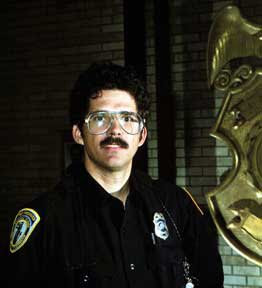 I had been the Albuquerque Police Officers Association President, left in a campaign photo, and I had put in motion the introduction of the bill.
I had been the Albuquerque Police Officers Association President, left in a campaign photo, and I had put in motion the introduction of the bill.An amendment, offered by the Chiefs of Police association, eviscerated that bill by eliminating the due process clause. I switched my position and opposed the legislation going forward.
My fellow union and Fraternal Order of Police lobbyists wanted to push the bill forward, saying we’ll get it in place then come back and fix it. They became angry when I testified against the bill.
I was yelled at in a public hallway for trying to “hurt police officers.” I was told that I couldn’t stop the bill; that it was greased all the way through. I don’t respond well to being yelled at. “Hide and watch,” I stated.
Long story short, I explained myself to two Representatives: Cisco McSorley, D, Bernalillo County, and Pauline Eisenstadt, D, Bernalillo and Sandoval Counties. The bill was killed with a do not pass recommendation in the House Judiciary committee made by McSorley, who was vice chair. Eisenstadt seconded the motion.
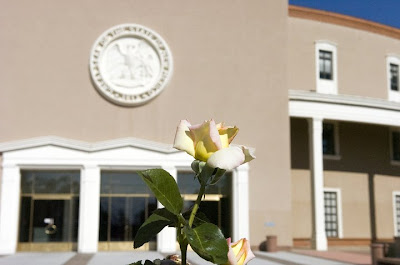 At the end of the 1987 State Legislature, the three Albuquerque Police Officers lobbying for the Fraternal Order of Police, sent McSorley a black rose with a note, with a drawing of a man with a knife in his back; it read: “Thanks for your support.” It wasn't one of the yellow roses from the west side of the Roundhouse.
At the end of the 1987 State Legislature, the three Albuquerque Police Officers lobbying for the Fraternal Order of Police, sent McSorley a black rose with a note, with a drawing of a man with a knife in his back; it read: “Thanks for your support.” It wasn't one of the yellow roses from the west side of the Roundhouse.McSorley did not know who sent the items and he took them as a threat. When the police department announced they were investigating, the FOP/APD lobbyists admitted they sent the flower, through a State Senator. The "Black Rose" incident came into full bloom. A very public investigation ensued. The usually secret activities of the Internal Affairs unit were being played out on the front pages of the daily papers and on television news.
 This is McSorley, above as he appears now in the Senate, where he has served since 1997.
This is McSorley, above as he appears now in the Senate, where he has served since 1997.McSorley was then a Representative, and I spoke with him about how the police leadership was manipulating the investigation, in part, by not getting him to sign a complaint. McSorley said, at the time, he was willing to sign, but was told by a deputy chief it was unnecessary. Police administrators were building a procedural loophole for a future grievance process. I had seen it before and understood the tactic.
On May 5, 1987, Albuquerque Tribune Staff Reporter Lynn Bartels wrote a story, entitled "'Black rose' investigation expands police also probe ex-head of union", "Albuquerque police were investigating whether the former president of the police union 'interfered' with a 'black rose' probe underway for the past three weeks." I had, "declined to make a statement except to say that if officers want to talk to people, 'it's an absolute' First Amendment right," Bartels wrote.
I was the subject of a new internal affairs investigation. The allegations were many, the proposed discipline harsh, and the defense simple, the First Amendment.
I had not made any threats to legislators, or anyone else, nor had I sent any flowers. I had been on the other side; trying to make the process work.
I had done everything they accused me of, but not for the reasons they said I did them. However, I held a “Get Out of Jail Free card; I had registered as a lobbyist, no one else involved in the case had. I had spoken to McSorley, protected by the right of free speech, association through assembly, and to petition government. My activities did not impact how I did my job. Everything I did that they accused me of was done off duty. I walked. However, the ramifications lasted for years; all the way to my retirement.
So what’s wrong with this picture?
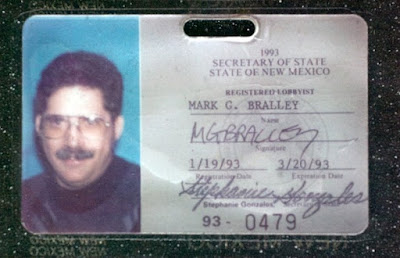 This is my 1993 registered lobbyist identification card, when the Police Officers Bill of Rights came before the legislature again. The bill was straightforward and worked its way through the legislative process without any attempts to alter it before its introduction or to amend it. It passed both house and was signed by the Governor. For me, it had been a 16-year effort to set in place, by law, some basic protections for officers during administrative investigations and grievance procedures. There were three legislative efforts before achieving success.
This is my 1993 registered lobbyist identification card, when the Police Officers Bill of Rights came before the legislature again. The bill was straightforward and worked its way through the legislative process without any attempts to alter it before its introduction or to amend it. It passed both house and was signed by the Governor. For me, it had been a 16-year effort to set in place, by law, some basic protections for officers during administrative investigations and grievance procedures. There were three legislative efforts before achieving success.
 Now comes rookie State Representative Eleanor Chavez, D, Bernalillo County, with HB 535 Lobbyist Identification Badges.
Now comes rookie State Representative Eleanor Chavez, D, Bernalillo County, with HB 535 Lobbyist Identification Badges.
The relevant language being:
Lobbyist Identification Badges Required.
Chavez told Democracy for New Mexico. The bill was publicized as:
The bill died awaiting its first hearing in the House Business and Industry Committee.
 Chavez, left, is one of the three “Progressive” Democrats elected from Bernalillo County by knocking off the old guard, Senators James Taylor and Shannon Robinson, and Representative Dan Silva during last year’s primary. None faced a general election opponent.
Chavez, left, is one of the three “Progressive” Democrats elected from Bernalillo County by knocking off the old guard, Senators James Taylor and Shannon Robinson, and Representative Dan Silva during last year’s primary. None faced a general election opponent.
Progressive is the new moniker for “Liberal.” It seems that the classification of the label “Liberal” was perceived as becoming a detriment.
Newly elected Sens. Eric Griego, replaced Taylor and Timothy Keller defeated Robinson, also introduced legislation directed at lobbyists.
Griego introduced SB 163 Prohibit Former Legislators as Lobbyists.
Sen. Mark Boitano, R, Bernalillo County, introduced an identically named bill restricting former legislators from being employed as lobbyists for one year after serving.
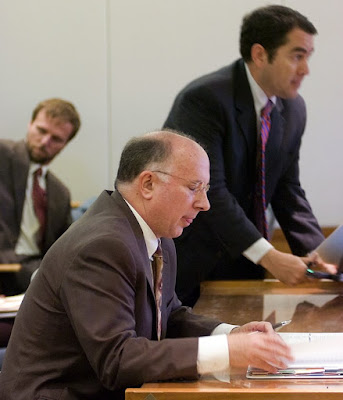 Griego joined Boitano in presenting their bills before the Senate Rules Committee. However, Chairwoman Linda Lopez, D, Bernalillo County, followed a long-standing policy of not reporting out multiple bills on the same topic.
Griego joined Boitano in presenting their bills before the Senate Rules Committee. However, Chairwoman Linda Lopez, D, Bernalillo County, followed a long-standing policy of not reporting out multiple bills on the same topic.
Griego and Boitano met and produced a substitute bill, which was carried as Griego's SB 163. Senate Rules approved the bill on a 4-1 vote; with Chairwoman Lopez, Peter Wirth, D, Santa Fe County, Dede Feldman, D, Bernalillo County, Kent Cravens, R, Bernalillo and Sandoval Counties, voting for, and Stuart Ingle, R, Chaves, Curry, De Baca, and Roosevelt, opposing. Sens. Dianna Duran, D, Dona Ana and Otero Counties, Senate President Pro Tem Timothy Jennings, D, Chaves, Eddy, Lincoln and Otero Counties, and Majority Leader Michael Sanchez, D, Valencia County, were excused.
The bill went to the House Judiciary Committee, where it passed on a 7-3 vote; with one excused.
The bill failed on the Senate floor on a 14-22 vote; with three excused.
 However, a question arose during the floor debate asking, how many former legislators were now lobbyists. Some other legislator, instead of simply asking the Secretary of State’s Public Information Officer James Flores, right, to compare the SoS’s index of registered lobbyists with the Legislative Council Services’ who has someone with an institutional historic memory, to come up with a number, challenged the press or more specifically, someone in the blogosphere to find that out.
However, a question arose during the floor debate asking, how many former legislators were now lobbyists. Some other legislator, instead of simply asking the Secretary of State’s Public Information Officer James Flores, right, to compare the SoS’s index of registered lobbyists with the Legislative Council Services’ who has someone with an institutional historic memory, to come up with a number, challenged the press or more specifically, someone in the blogosphere to find that out.
According to the current Secretary of State’s index of registered lobbyists, this is what I determined. I might have missed some because I don’t know all the former legislators.
The breadth of their client's list is telling of their perceived ability to carry the message:
Former State Sen. Mickey Dee Barnett
Labor Ready Southwest Inc/True Blue Inc
New Mexico Independent Finance Association
Reynolds American Inc
Santa Ana Pueblo
Former State Sen. Tom Benavides
New Mexicans for Moral and Constitutional Government
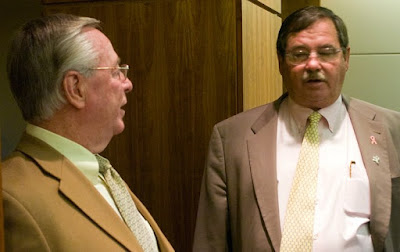 Former State Sen. and former Lt. Gov. Walter Bradley, R, left, speaking with Sen. Jennings after a senate Rules Committee meeting.
Former State Sen. and former Lt. Gov. Walter Bradley, R, left, speaking with Sen. Jennings after a senate Rules Committee meeting.
Dairy Farmers of America Inc.
Former State Rep. and State Sen. Fabián Chávez, Jr.
New Mexico Public Employees Retirement Assoc (PERA)
Former State Sen. Tito Chávez
Association Of American Publishers, Inc.
Digital Arts & Technology Academy
New Mexico Association Of Counties
Former State Sen. Christine Donisthorpe
City of Aztec, New Mexico
City of Bloomfield, NM
San Juan County
Former State Sen, Roman Maes III
Ca. Inc.
National Center for Genome Resources
New Mexico Public Relations Orion Technologies Qwest Corporation
Real Estate Central
Former State Rep. Richard “Dick” Minzner
Ajinomoto Food Ingredients LLC
American Council of Life Insurers
FPL Energy, LLC
Mesilla Valley Hospital
Neutron Energy Inc.
New Mexico Boys and Girls Ranches
Psychiatrics Solutions Inc
Tri-State Generation & Transmission Association, Inc.
University of New Mexico
Westland Devco LP
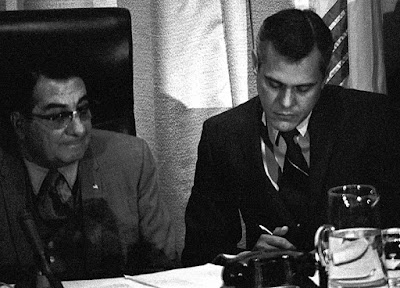 Former Speaker of the House Rep. David L. Norvell, and husband of current Rep. Gail Chasey. Norvell, right, is seen here with then Lt. Gov. Eli Frances, at the opening of the 1970 Legislature where Gov. David Cargo gave his State of the State address.
Former Speaker of the House Rep. David L. Norvell, and husband of current Rep. Gail Chasey. Norvell, right, is seen here with then Lt. Gov. Eli Frances, at the opening of the 1970 Legislature where Gov. David Cargo gave his State of the State address.
New Mexico Gaming Control Board
Former State Rep. M. Michael Olguin
Cottonwood Financial Administration Service, LLC.
Cottonwood Financial, Ltd.
Laguna Development Corp.
Olguin and Riordan
Pueblo of Laguna
Former State Rep. Hoyt Pattison
Dairy Producers of New Mexico
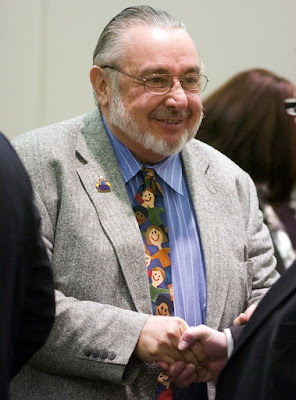 Former State Sen. Tom Rutherford
Former State Sen. Tom Rutherford
Access Concierge
Albuquerque Economic Development
Anderson-Abruzzo Balloon Museum Foundation,
Angel Fire Resort Operation, LLC
Associated Builders And Contractors Inc NM Chapter
Chevron Mining Inc.
City of Clayton
Cumbres & Toltec Scenic Railroad
Dollar Rent A Car/Santa Fe Fleet Services
DPMS, Inc.,
Express Ranches/UU Bar
Film Industry Promotion Assoc.
Honeywell International, Inc.,
Moreno Valley Education Foundation
National Atomic Museum Foundation
National Council To Prevent Delinquency
New Mexico Council of Outfitters and Guides,
New Mexico Symphony Orchestra,
NM Legislative Sportsmen Foundation,
Northern New Mexico Independent Electrical Contractors,
Union County,
United Blood Services of New Mexico,
Unser Racing Museum.
Value Options Inc.
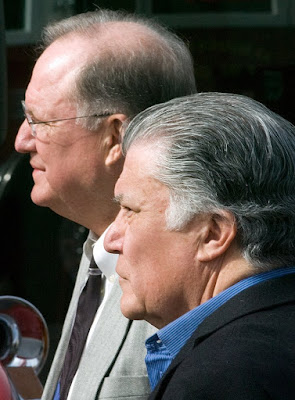 Former Speaker of the House Rep. Raymond G. Sanchez, right front, with his brother, current Senate Majority Leader Michael Sanchez, left rear. Ray Sanchez is also the newly appointed President of the University of New Mexico Regents replacing Jamie Koch at the insistence of Gov. Bill Richardson.
Former Speaker of the House Rep. Raymond G. Sanchez, right front, with his brother, current Senate Majority Leader Michael Sanchez, left rear. Ray Sanchez is also the newly appointed President of the University of New Mexico Regents replacing Jamie Koch at the insistence of Gov. Bill Richardson.
3M Traffic Safety Systems Division
Albuquerque Area Fire Fighters Local
Allsups Convenience Stores Inc.
Consumer Installment Loan Association
Forest City Covington NM LLC
New Mexico Horse Breeders Association
NM Hearing Health Care Providers Association
Save the Children Federation Inc.
Stewart Title Guaranty Co.
Winrock Partners, LLC
Former State Rep. Daniel P. Silva
Jalapeno Corporation
Former State Rep. Garth Simms
New Mexico Council of Outfitters and Guides
 Former State Sen. H. Diane Snyder
Former State Sen. H. Diane Snyder
American Consulting Engineers Council Of New Mexico
H.D. Snyder And Associates
Former State Rep. John Lee Thompson
American Academy of Aphthalmology
American Consulting Engineers Council of New Mexico
Burlington Northern Santa Fe Railway Company
Butch Maki and Associates
L & F Distributors, LLC.
Middle Rio Grande Conservancy District
New Mexico Funeral Service Association
New Mexico Horsemen's Association
Premier Distributing Company
Former State Rep. Joseph M. Thompson
Anderson-Abruzzo Balloon Museum Foundation
Associated Builders and Contractors Inc NM Chapter
Circle P of New Mexico, LLC
City of Clayton
Eastern New Mexico Rural Water Authority
Equality New Mexico
Georgia O'Keefe Museum
National Atomic Museum Foundation
New Mexico Optometric Association
New Mexico Shooting Sports Association
New Mexico Symphony Orchestra
Northern New Mexico Independent Electrical Contractors
Paseo Gateway, LLC
Saddleback Ranch Estates, LLC
Santa Fe Properties, Inc.
Thompson Consulting
Union County
University of New Mexico
Value Options of New Mexico
Westland Devco LP
Former State Sen. R. E. Thompson
Albuquerque Academy
General Motors Corporation
McLane Company Inc
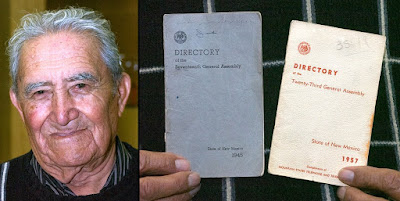 This is former State Rep. Johnnie Archebeque, D, Sandoval County. He is 86 years old and holds the Legislative directories from when he served in 1945-46 and 1957-58. He is currently lobbying for the American Association of Retired Persons and the National Education Association New Mexico.
This is former State Rep. Johnnie Archebeque, D, Sandoval County. He is 86 years old and holds the Legislative directories from when he served in 1945-46 and 1957-58. He is currently lobbying for the American Association of Retired Persons and the National Education Association New Mexico.
Had the law already been in effect, only Silva and Snyder would have been banned for the one-year, because they only left office Dec. 31, 2008.

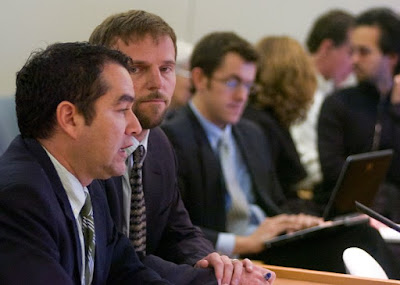 Sen. Eric Griego, left, with Common Cause’s Executive Director Steven Robert Allen, also sponsored SB 165 Public Campaign Act, presenting it before the Senate Rules committee. The bill would provide for voluntary public campaign financing of elections for Governor, Lieutenant Governor, Attorney General, Commissioner of Public Lands, State Treasurer, State Auditor, Secretary of State and State Legislators. It was stalled on a 3-3 vote, tabled and never moved. There was a high fiscal impact associated with the bill and in the economic crush; even Griego understood the fate of the bill.
Sen. Eric Griego, left, with Common Cause’s Executive Director Steven Robert Allen, also sponsored SB 165 Public Campaign Act, presenting it before the Senate Rules committee. The bill would provide for voluntary public campaign financing of elections for Governor, Lieutenant Governor, Attorney General, Commissioner of Public Lands, State Treasurer, State Auditor, Secretary of State and State Legislators. It was stalled on a 3-3 vote, tabled and never moved. There was a high fiscal impact associated with the bill and in the economic crush; even Griego understood the fate of the bill.
Griego did not responded to an e-mail request to his legislative address for comment on this story.
SB 693, Relating to elections; prohibiting certain contributions and solicitations of contributions by business entities and lobbyists and the principals of state contractors; prohibiting certain solicitations of contributions from business entities and lobbyists and the principals of state contractors.
SJR 14 a joint resolution proposing an amendment to Article 4 of the Constitution of New Mexico to allow employees of educational institutions to serve as legislators.
These bills were left stuck in the Senate Rules Committee at the end of the session.
Sens. Keller, left, Sue Wilson Beffort, R, Bernalillo, Sandoval, Santa Fe and Torrance Counties, right, and Feldman, center, presented bills that would prohibit contractors from making political contributions for up to two years prior to accepting any State work.
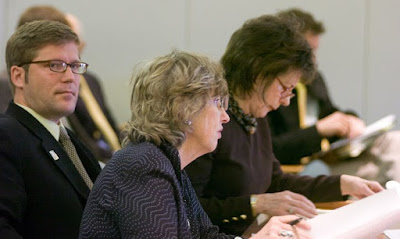 Keller introduced, SB 258, it was merged along with SB 296 sponsored by Sen. Feldman and into substitute bill SB 263 sponsored by Sen. Wilson Beffort, which passed the Senate 26-11 and received a do pass recommendation from the House Consumer and Public Affairs Committee A similarly named bill was introduced in the House by Rep. Tom Taylor, R, San Juan, as HB 244 Prohibit Contractor Contribution Solicitation which was left stalled in the House Voters and Elections committee.
Keller introduced, SB 258, it was merged along with SB 296 sponsored by Sen. Feldman and into substitute bill SB 263 sponsored by Sen. Wilson Beffort, which passed the Senate 26-11 and received a do pass recommendation from the House Consumer and Public Affairs Committee A similarly named bill was introduced in the House by Rep. Tom Taylor, R, San Juan, as HB 244 Prohibit Contractor Contribution Solicitation which was left stalled in the House Voters and Elections committee.
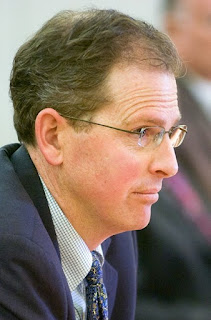 Sen. Wirth, left, introduced SB 128, requiring biannual campaign reports; it passed both houses and the Governor signed it.
Sen. Wirth, left, introduced SB 128, requiring biannual campaign reports; it passed both houses and the Governor signed it.
Most, so called ethics bills, littered the path to successful legislation for a variety of reasons.
Many activists are quick to point fingers at leaders or members for blocking or stalling bills they see as good and necessary. It might be true that some of the bills are worthy of more consideration than what they were relegated, but the political process is one of bringing offered legislation together with receptive legislators.
One activist’s perfect solution may be one legislator’s worst nightmare, not because there is something evil about how the legislator views the world, but because the activist’s solution doesn’t solve the problem; it simply compounds it.
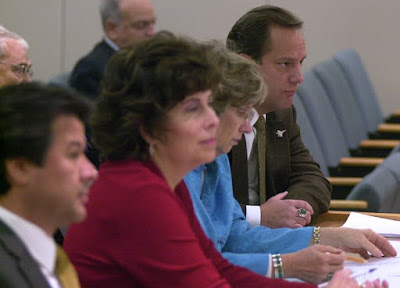 Four Senators: Pete Campos, D, Guadalupe, Mora, San Miguel, Santa Fe, and Torrance Counties, Lopez, Feldman, and John C. Ryan, R, Bernalillo and Sandoval Counties, individually carried State Ethics Commission Acts. Under the committee's rule to form a substitute, the four Senators retired to work on a consensus, but never returned.
Four Senators: Pete Campos, D, Guadalupe, Mora, San Miguel, Santa Fe, and Torrance Counties, Lopez, Feldman, and John C. Ryan, R, Bernalillo and Sandoval Counties, individually carried State Ethics Commission Acts. Under the committee's rule to form a substitute, the four Senators retired to work on a consensus, but never returned.
 History
History
The First Amendment of the Constitution reads:
Section 1. Supreme law of the land.
Rep. Chavez’ proposal would make law that steps on at least three of the Constitutional rights by pre-conditioning citizens to wear badges identifying them as “Lobbyists.” The rights are: speech, assembly, and the right to petition the Government for redress of grievances.
 Analysis
Analysis
Badges denote office.
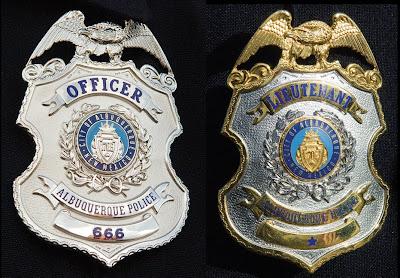 Rep. Chavez has it totally upside down. Officers of government wear badges; police and fire officers wear chest plates, like the newly issued Albuquerque Police department badges. Rank has more color, gold in this case for ranking officers.
Rep. Chavez has it totally upside down. Officers of government wear badges; police and fire officers wear chest plates, like the newly issued Albuquerque Police department badges. Rank has more color, gold in this case for ranking officers.
In South America Mayors wear sashes of their community's colors; presidents were the colors of their flag. In Europe Mayors wear chains, sometimes with the keys of the city. Kings and Queens wear crowns.
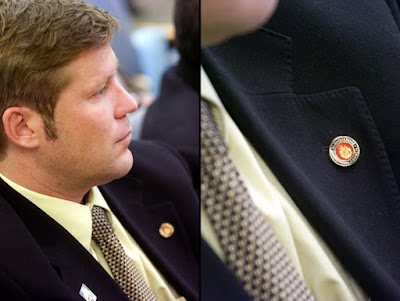 Sen. Keller wears a lapel pin of the Albuquerque City Council. It was a gift from City Councillor Rey Garduno, whose district covers half of Keller's Senate District. Garduno also served on Keller's campaign committee. The pin is an example of a badge of office.
Sen. Keller wears a lapel pin of the Albuquerque City Council. It was a gift from City Councillor Rey Garduno, whose district covers half of Keller's Senate District. Garduno also served on Keller's campaign committee. The pin is an example of a badge of office.
So what’s wrong with this picture?
 This is my 1993 registered lobbyist identification card, when the Police Officers Bill of Rights came before the legislature again. The bill was straightforward and worked its way through the legislative process without any attempts to alter it before its introduction or to amend it. It passed both house and was signed by the Governor. For me, it had been a 16-year effort to set in place, by law, some basic protections for officers during administrative investigations and grievance procedures. There were three legislative efforts before achieving success.
This is my 1993 registered lobbyist identification card, when the Police Officers Bill of Rights came before the legislature again. The bill was straightforward and worked its way through the legislative process without any attempts to alter it before its introduction or to amend it. It passed both house and was signed by the Governor. For me, it had been a 16-year effort to set in place, by law, some basic protections for officers during administrative investigations and grievance procedures. There were three legislative efforts before achieving success. Now comes rookie State Representative Eleanor Chavez, D, Bernalillo County, with HB 535 Lobbyist Identification Badges.
Now comes rookie State Representative Eleanor Chavez, D, Bernalillo County, with HB 535 Lobbyist Identification Badges.The relevant language being:
Lobbyist Identification Badges Required.
A. Upon the filing of a registration statement pursuant to Section 2-11-3 NMSA 1978, the secretary of state shall issue to each registered lobbyist an identification badge that shall contain in plain, bold and legible letters the word "Lobbyist" and the name of the lobbyist. The badge shall also contain in plain legible letters the year and the names of all of the lobbyist's employers. The secretary of state shall change the color of the badge each year.Legislators and the public attending the capitol will all know who the lobbyists are.
B. Every registered lobbyist shall conspicuously display the identification badge on the lobbyist's clothing while in the state capitol during a regular session, special session, extraordinary session or interim committee meeting of the legislature.
C. The secretary of state shall collect a fee of ten dollars ($10.00) for the issuance of a duplicate lobbyist identification badge.
Chavez told Democracy for New Mexico. The bill was publicized as:
“We in the Legislature need to know at a glance who the lobbyists are and who they represent,” said Rep. Chavez. “This measure will bring critically needed transparency to the legislative process and will increase the public’s confidence in our government."The recommendation to have lobbyist's identified by a badge came from the Governor's Ethics Task Force, according to New Mexico Common Cause’s Executive Director Steven Robert Allen. There were two tasks forces, in 2006 and it was reconstituted in 2007 after little was accomplished from the first series of recommendations.
The bill died awaiting its first hearing in the House Business and Industry Committee.
 Chavez, left, is one of the three “Progressive” Democrats elected from Bernalillo County by knocking off the old guard, Senators James Taylor and Shannon Robinson, and Representative Dan Silva during last year’s primary. None faced a general election opponent.
Chavez, left, is one of the three “Progressive” Democrats elected from Bernalillo County by knocking off the old guard, Senators James Taylor and Shannon Robinson, and Representative Dan Silva during last year’s primary. None faced a general election opponent.Progressive is the new moniker for “Liberal.” It seems that the classification of the label “Liberal” was perceived as becoming a detriment.
Newly elected Sens. Eric Griego, replaced Taylor and Timothy Keller defeated Robinson, also introduced legislation directed at lobbyists.
Griego introduced SB 163 Prohibit Former Legislators as Lobbyists.
Sen. Mark Boitano, R, Bernalillo County, introduced an identically named bill restricting former legislators from being employed as lobbyists for one year after serving.
 Griego joined Boitano in presenting their bills before the Senate Rules Committee. However, Chairwoman Linda Lopez, D, Bernalillo County, followed a long-standing policy of not reporting out multiple bills on the same topic.
Griego joined Boitano in presenting their bills before the Senate Rules Committee. However, Chairwoman Linda Lopez, D, Bernalillo County, followed a long-standing policy of not reporting out multiple bills on the same topic.Griego and Boitano met and produced a substitute bill, which was carried as Griego's SB 163. Senate Rules approved the bill on a 4-1 vote; with Chairwoman Lopez, Peter Wirth, D, Santa Fe County, Dede Feldman, D, Bernalillo County, Kent Cravens, R, Bernalillo and Sandoval Counties, voting for, and Stuart Ingle, R, Chaves, Curry, De Baca, and Roosevelt, opposing. Sens. Dianna Duran, D, Dona Ana and Otero Counties, Senate President Pro Tem Timothy Jennings, D, Chaves, Eddy, Lincoln and Otero Counties, and Majority Leader Michael Sanchez, D, Valencia County, were excused.
The bill went to the House Judiciary Committee, where it passed on a 7-3 vote; with one excused.
The bill failed on the Senate floor on a 14-22 vote; with three excused.
 However, a question arose during the floor debate asking, how many former legislators were now lobbyists. Some other legislator, instead of simply asking the Secretary of State’s Public Information Officer James Flores, right, to compare the SoS’s index of registered lobbyists with the Legislative Council Services’ who has someone with an institutional historic memory, to come up with a number, challenged the press or more specifically, someone in the blogosphere to find that out.
However, a question arose during the floor debate asking, how many former legislators were now lobbyists. Some other legislator, instead of simply asking the Secretary of State’s Public Information Officer James Flores, right, to compare the SoS’s index of registered lobbyists with the Legislative Council Services’ who has someone with an institutional historic memory, to come up with a number, challenged the press or more specifically, someone in the blogosphere to find that out.According to the current Secretary of State’s index of registered lobbyists, this is what I determined. I might have missed some because I don’t know all the former legislators.
The breadth of their client's list is telling of their perceived ability to carry the message:
Former State Sen. Mickey Dee Barnett
Labor Ready Southwest Inc/True Blue Inc
New Mexico Independent Finance Association
Reynolds American Inc
Santa Ana Pueblo
Former State Sen. Tom Benavides
New Mexicans for Moral and Constitutional Government
 Former State Sen. and former Lt. Gov. Walter Bradley, R, left, speaking with Sen. Jennings after a senate Rules Committee meeting.
Former State Sen. and former Lt. Gov. Walter Bradley, R, left, speaking with Sen. Jennings after a senate Rules Committee meeting.Dairy Farmers of America Inc.
Former State Rep. and State Sen. Fabián Chávez, Jr.
New Mexico Public Employees Retirement Assoc (PERA)
Former State Sen. Tito Chávez
Association Of American Publishers, Inc.
Digital Arts & Technology Academy
New Mexico Association Of Counties
Former State Sen. Christine Donisthorpe
City of Aztec, New Mexico
City of Bloomfield, NM
San Juan County
Former State Sen, Roman Maes III
Ca. Inc.
National Center for Genome Resources
New Mexico Public Relations Orion Technologies Qwest Corporation
Real Estate Central
Former State Rep. Richard “Dick” Minzner
Ajinomoto Food Ingredients LLC
American Council of Life Insurers
FPL Energy, LLC
Mesilla Valley Hospital
Neutron Energy Inc.
New Mexico Boys and Girls Ranches
Psychiatrics Solutions Inc
Tri-State Generation & Transmission Association, Inc.
University of New Mexico
Westland Devco LP
 Former Speaker of the House Rep. David L. Norvell, and husband of current Rep. Gail Chasey. Norvell, right, is seen here with then Lt. Gov. Eli Frances, at the opening of the 1970 Legislature where Gov. David Cargo gave his State of the State address.
Former Speaker of the House Rep. David L. Norvell, and husband of current Rep. Gail Chasey. Norvell, right, is seen here with then Lt. Gov. Eli Frances, at the opening of the 1970 Legislature where Gov. David Cargo gave his State of the State address.New Mexico Gaming Control Board
Former State Rep. M. Michael Olguin
Cottonwood Financial Administration Service, LLC.
Cottonwood Financial, Ltd.
Laguna Development Corp.
Olguin and Riordan
Pueblo of Laguna
Former State Rep. Hoyt Pattison
Dairy Producers of New Mexico
 Former State Sen. Tom Rutherford
Former State Sen. Tom RutherfordAccess Concierge
Albuquerque Economic Development
Anderson-Abruzzo Balloon Museum Foundation,
Angel Fire Resort Operation, LLC
Associated Builders And Contractors Inc NM Chapter
Chevron Mining Inc.
City of Clayton
Cumbres & Toltec Scenic Railroad
Dollar Rent A Car/Santa Fe Fleet Services
DPMS, Inc.,
Express Ranches/UU Bar
Film Industry Promotion Assoc.
Honeywell International, Inc.,
Moreno Valley Education Foundation
National Atomic Museum Foundation
National Council To Prevent Delinquency
New Mexico Council of Outfitters and Guides,
New Mexico Symphony Orchestra,
NM Legislative Sportsmen Foundation,
Northern New Mexico Independent Electrical Contractors,
Union County,
United Blood Services of New Mexico,
Unser Racing Museum.
Value Options Inc.
 Former Speaker of the House Rep. Raymond G. Sanchez, right front, with his brother, current Senate Majority Leader Michael Sanchez, left rear. Ray Sanchez is also the newly appointed President of the University of New Mexico Regents replacing Jamie Koch at the insistence of Gov. Bill Richardson.
Former Speaker of the House Rep. Raymond G. Sanchez, right front, with his brother, current Senate Majority Leader Michael Sanchez, left rear. Ray Sanchez is also the newly appointed President of the University of New Mexico Regents replacing Jamie Koch at the insistence of Gov. Bill Richardson.3M Traffic Safety Systems Division
Albuquerque Area Fire Fighters Local
Allsups Convenience Stores Inc.
Consumer Installment Loan Association
Forest City Covington NM LLC
New Mexico Horse Breeders Association
NM Hearing Health Care Providers Association
Save the Children Federation Inc.
Stewart Title Guaranty Co.
Winrock Partners, LLC
Former State Rep. Daniel P. Silva
Jalapeno Corporation
Former State Rep. Garth Simms
New Mexico Council of Outfitters and Guides
 Former State Sen. H. Diane Snyder
Former State Sen. H. Diane SnyderAmerican Consulting Engineers Council Of New Mexico
H.D. Snyder And Associates
Former State Rep. John Lee Thompson
American Academy of Aphthalmology
American Consulting Engineers Council of New Mexico
Burlington Northern Santa Fe Railway Company
Butch Maki and Associates
L & F Distributors, LLC.
Middle Rio Grande Conservancy District
New Mexico Funeral Service Association
New Mexico Horsemen's Association
Premier Distributing Company
Former State Rep. Joseph M. Thompson
Anderson-Abruzzo Balloon Museum Foundation
Associated Builders and Contractors Inc NM Chapter
Circle P of New Mexico, LLC
City of Clayton
Eastern New Mexico Rural Water Authority
Equality New Mexico
Georgia O'Keefe Museum
National Atomic Museum Foundation
New Mexico Optometric Association
New Mexico Shooting Sports Association
New Mexico Symphony Orchestra
Northern New Mexico Independent Electrical Contractors
Paseo Gateway, LLC
Saddleback Ranch Estates, LLC
Santa Fe Properties, Inc.
Thompson Consulting
Union County
University of New Mexico
Value Options of New Mexico
Westland Devco LP
Former State Sen. R. E. Thompson
Albuquerque Academy
General Motors Corporation
McLane Company Inc
 This is former State Rep. Johnnie Archebeque, D, Sandoval County. He is 86 years old and holds the Legislative directories from when he served in 1945-46 and 1957-58. He is currently lobbying for the American Association of Retired Persons and the National Education Association New Mexico.
This is former State Rep. Johnnie Archebeque, D, Sandoval County. He is 86 years old and holds the Legislative directories from when he served in 1945-46 and 1957-58. He is currently lobbying for the American Association of Retired Persons and the National Education Association New Mexico.Had the law already been in effect, only Silva and Snyder would have been banned for the one-year, because they only left office Dec. 31, 2008.

 Sen. Eric Griego, left, with Common Cause’s Executive Director Steven Robert Allen, also sponsored SB 165 Public Campaign Act, presenting it before the Senate Rules committee. The bill would provide for voluntary public campaign financing of elections for Governor, Lieutenant Governor, Attorney General, Commissioner of Public Lands, State Treasurer, State Auditor, Secretary of State and State Legislators. It was stalled on a 3-3 vote, tabled and never moved. There was a high fiscal impact associated with the bill and in the economic crush; even Griego understood the fate of the bill.
Sen. Eric Griego, left, with Common Cause’s Executive Director Steven Robert Allen, also sponsored SB 165 Public Campaign Act, presenting it before the Senate Rules committee. The bill would provide for voluntary public campaign financing of elections for Governor, Lieutenant Governor, Attorney General, Commissioner of Public Lands, State Treasurer, State Auditor, Secretary of State and State Legislators. It was stalled on a 3-3 vote, tabled and never moved. There was a high fiscal impact associated with the bill and in the economic crush; even Griego understood the fate of the bill.Griego did not responded to an e-mail request to his legislative address for comment on this story.
SB 693, Relating to elections; prohibiting certain contributions and solicitations of contributions by business entities and lobbyists and the principals of state contractors; prohibiting certain solicitations of contributions from business entities and lobbyists and the principals of state contractors.
SJR 14 a joint resolution proposing an amendment to Article 4 of the Constitution of New Mexico to allow employees of educational institutions to serve as legislators.
These bills were left stuck in the Senate Rules Committee at the end of the session.
Sens. Keller, left, Sue Wilson Beffort, R, Bernalillo, Sandoval, Santa Fe and Torrance Counties, right, and Feldman, center, presented bills that would prohibit contractors from making political contributions for up to two years prior to accepting any State work.
 Keller introduced, SB 258, it was merged along with SB 296 sponsored by Sen. Feldman and into substitute bill SB 263 sponsored by Sen. Wilson Beffort, which passed the Senate 26-11 and received a do pass recommendation from the House Consumer and Public Affairs Committee A similarly named bill was introduced in the House by Rep. Tom Taylor, R, San Juan, as HB 244 Prohibit Contractor Contribution Solicitation which was left stalled in the House Voters and Elections committee.
Keller introduced, SB 258, it was merged along with SB 296 sponsored by Sen. Feldman and into substitute bill SB 263 sponsored by Sen. Wilson Beffort, which passed the Senate 26-11 and received a do pass recommendation from the House Consumer and Public Affairs Committee A similarly named bill was introduced in the House by Rep. Tom Taylor, R, San Juan, as HB 244 Prohibit Contractor Contribution Solicitation which was left stalled in the House Voters and Elections committee. Sen. Wirth, left, introduced SB 128, requiring biannual campaign reports; it passed both houses and the Governor signed it.
Sen. Wirth, left, introduced SB 128, requiring biannual campaign reports; it passed both houses and the Governor signed it.Most, so called ethics bills, littered the path to successful legislation for a variety of reasons.
Many activists are quick to point fingers at leaders or members for blocking or stalling bills they see as good and necessary. It might be true that some of the bills are worthy of more consideration than what they were relegated, but the political process is one of bringing offered legislation together with receptive legislators.
One activist’s perfect solution may be one legislator’s worst nightmare, not because there is something evil about how the legislator views the world, but because the activist’s solution doesn’t solve the problem; it simply compounds it.
 Four Senators: Pete Campos, D, Guadalupe, Mora, San Miguel, Santa Fe, and Torrance Counties, Lopez, Feldman, and John C. Ryan, R, Bernalillo and Sandoval Counties, individually carried State Ethics Commission Acts. Under the committee's rule to form a substitute, the four Senators retired to work on a consensus, but never returned.
Four Senators: Pete Campos, D, Guadalupe, Mora, San Miguel, Santa Fe, and Torrance Counties, Lopez, Feldman, and John C. Ryan, R, Bernalillo and Sandoval Counties, individually carried State Ethics Commission Acts. Under the committee's rule to form a substitute, the four Senators retired to work on a consensus, but never returned. History
HistoryThe First Amendment of the Constitution reads:
Congress shall make no law respecting the establishment of religion; or prohibiting the free exercise thereof; or abridging the freedom of speech, or of the press; or the right of the people peaceably to assemble, and petition the Government for redress of grievances.The Bill of Rights are also binding on the State by the 14th Amendment and by the State’s own Constitution.
Section 1. Supreme law of the land.
The state of New Mexico is an inseparable part of the federal union, and the constitution of the United States is the supreme law of the land.Sec. 17. Freedom of speech and press; libel.
Every person may freely speak, write and publish his sentiments on all subjects, being responsible for the abuse of that right; and no law shall be passed to restrain or abridge the liberty of speech or of the press. In all criminal prosecutions for libels, the truth may be given in evidence to the jury; and if it shall appear to the jury that the matter charged as libelous is true and was published with good motives and for justifiable ends, the party shall be acquitted.Congress, nor the State shall make no law. No law!
Rep. Chavez’ proposal would make law that steps on at least three of the Constitutional rights by pre-conditioning citizens to wear badges identifying them as “Lobbyists.” The rights are: speech, assembly, and the right to petition the Government for redress of grievances.
 Analysis
AnalysisBadges denote office.
 Rep. Chavez has it totally upside down. Officers of government wear badges; police and fire officers wear chest plates, like the newly issued Albuquerque Police department badges. Rank has more color, gold in this case for ranking officers.
Rep. Chavez has it totally upside down. Officers of government wear badges; police and fire officers wear chest plates, like the newly issued Albuquerque Police department badges. Rank has more color, gold in this case for ranking officers.In South America Mayors wear sashes of their community's colors; presidents were the colors of their flag. In Europe Mayors wear chains, sometimes with the keys of the city. Kings and Queens wear crowns.
 Sen. Keller wears a lapel pin of the Albuquerque City Council. It was a gift from City Councillor Rey Garduno, whose district covers half of Keller's Senate District. Garduno also served on Keller's campaign committee. The pin is an example of a badge of office.
Sen. Keller wears a lapel pin of the Albuquerque City Council. It was a gift from City Councillor Rey Garduno, whose district covers half of Keller's Senate District. Garduno also served on Keller's campaign committee. The pin is an example of a badge of office.
Keller said in an interview, that when he was carrying a specific piece of legislation for a group or organization, like unions or the university, he would wear their pins.
Keller said he met a number of lobbyists during the session wearing very tastefully designed silver and turquoise lapel pins that said, "New Mexico lobbyist" in an effort to be recognized.
 During Roman times, Senators wore the toga praetexta with its broad purple stripe, maroon shoes and if they were of the rank of curule magistracy, denoted by a gold buckle; they had the right to speak in the senate and to vote.
During Roman times, Senators wore the toga praetexta with its broad purple stripe, maroon shoes and if they were of the rank of curule magistracy, denoted by a gold buckle; they had the right to speak in the senate and to vote.
As an aside, the Roman Senate had its own ethical rule:
Senators were forbidden to engage in mercantile activities outside of the ownership of land and natural resources.
What are we doing? Is this the first “innocent” step to make a lawful act visible? Are we requiring people to wear a sign like lepers were made to do, warning of their highly contagious disease?
Such minor acts grew into the horror of Nazi Germany. At first it didn’t sound so bad, but it was. Later, the required wearing of symbols denoting: Jews, gypsies, homosexuals, and others, allowed for the rapid identification of marked people who were rounded up, imprisoned in concentration camps, with many exterminated.
Such derision is not without history in the United States. Japanese-Americans were rounded up at the beginning of World War II. Recall my posting on Manzanar. Recently the Patriot act permitted holding people without the right of habeas corpus.
If Rep. Chavez wants to know with whom she's talking, she should just ask. Lobbyists will not deny their information or identity because that defeats the entire purpose in contacting legislators.
Shakespeare had a character in Henry VI proclaim, “The first thing we do, let’s kill all the lawyers.”
In Henry VI’s time, lawyers did the lobbying, the advising as regents for the infant King and then all through his unstable reign.
The Progressives are not trying to figuratively kill the lobbyists that they see as wielding unacceptable influence and power. They appear to be just trying to blunt what the Progressives see as those lobbyists from wielding what they see as unacceptable influence and power.
As the process commenced, bills came up for debate before the Senate Rules committee that included limiting the influence of what are called nonprofits from using tax-exempt funds for political purposes.
Chavez wasn’t totally wrong, she sponsored HB 534, allowing for electronic request of public records; requiring a public records custodian to make public records available via electronic media upon request. Previously, some government agencies required in person inspection of such records, that now maybe provided by electronic means.
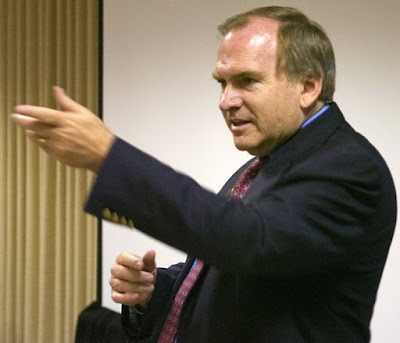 This bill was also supported by Attorney General Gary King, above, who spoke about the issue of technology impacting the Public Records Inspections Act, during a legal continuing education credit seminar Aug. 8, 2008, which I reported for Peter St. Cyr.
This bill was also supported by Attorney General Gary King, above, who spoke about the issue of technology impacting the Public Records Inspections Act, during a legal continuing education credit seminar Aug. 8, 2008, which I reported for Peter St. Cyr.
 My Take
My Take
So what is it that makes lobbyists a bad word? Some wish to associate lobbyists with corruptive activities. There is an image of shady characters with bags full of money being handed to politicians under the table.
Keller said he met a number of lobbyists during the session wearing very tastefully designed silver and turquoise lapel pins that said, "New Mexico lobbyist" in an effort to be recognized.
 During Roman times, Senators wore the toga praetexta with its broad purple stripe, maroon shoes and if they were of the rank of curule magistracy, denoted by a gold buckle; they had the right to speak in the senate and to vote.
During Roman times, Senators wore the toga praetexta with its broad purple stripe, maroon shoes and if they were of the rank of curule magistracy, denoted by a gold buckle; they had the right to speak in the senate and to vote.As an aside, the Roman Senate had its own ethical rule:
Senators were forbidden to engage in mercantile activities outside of the ownership of land and natural resources.
What are we doing? Is this the first “innocent” step to make a lawful act visible? Are we requiring people to wear a sign like lepers were made to do, warning of their highly contagious disease?
Such minor acts grew into the horror of Nazi Germany. At first it didn’t sound so bad, but it was. Later, the required wearing of symbols denoting: Jews, gypsies, homosexuals, and others, allowed for the rapid identification of marked people who were rounded up, imprisoned in concentration camps, with many exterminated.
Such derision is not without history in the United States. Japanese-Americans were rounded up at the beginning of World War II. Recall my posting on Manzanar. Recently the Patriot act permitted holding people without the right of habeas corpus.
If Rep. Chavez wants to know with whom she's talking, she should just ask. Lobbyists will not deny their information or identity because that defeats the entire purpose in contacting legislators.
Shakespeare had a character in Henry VI proclaim, “The first thing we do, let’s kill all the lawyers.”
In Henry VI’s time, lawyers did the lobbying, the advising as regents for the infant King and then all through his unstable reign.
The Progressives are not trying to figuratively kill the lobbyists that they see as wielding unacceptable influence and power. They appear to be just trying to blunt what the Progressives see as those lobbyists from wielding what they see as unacceptable influence and power.
As the process commenced, bills came up for debate before the Senate Rules committee that included limiting the influence of what are called nonprofits from using tax-exempt funds for political purposes.
Chavez wasn’t totally wrong, she sponsored HB 534, allowing for electronic request of public records; requiring a public records custodian to make public records available via electronic media upon request. Previously, some government agencies required in person inspection of such records, that now maybe provided by electronic means.
 This bill was also supported by Attorney General Gary King, above, who spoke about the issue of technology impacting the Public Records Inspections Act, during a legal continuing education credit seminar Aug. 8, 2008, which I reported for Peter St. Cyr.
This bill was also supported by Attorney General Gary King, above, who spoke about the issue of technology impacting the Public Records Inspections Act, during a legal continuing education credit seminar Aug. 8, 2008, which I reported for Peter St. Cyr. My Take
My TakeSo what is it that makes lobbyists a bad word? Some wish to associate lobbyists with corruptive activities. There is an image of shady characters with bags full of money being handed to politicians under the table.
Mention, Congress shall make no law, in the context of lobby registration or limitations, and you may get the response I have gotten more than once; it's about the money. It came fast, emphatically, and with a sneer. In a perfect world money would be unnecessary in the political sphere; but candidates must get their name known and that costs. In that perfect world, candidates would discuss issues and explain their agendas without having to attack their opponent. As costly as that has become, it seems cheaper to spend huge amounts negatively.
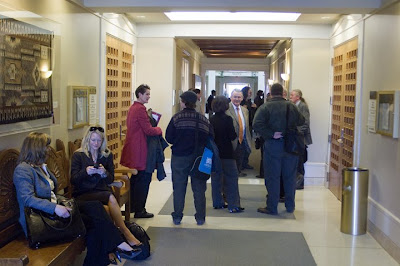 People clog the halls of the legislature during the committee meetings. Some are registered lobbyists, most are interested in some issue on the agenda. Few just go to the legislature to watch. Most lobbying happens much earlier, before the session, as legislation is drafted. The money that many object to is what is donated to campaigns. The amounts that professional lobbyists earn is more likely a reflection of their persuasive skills, than them carrying money.
People clog the halls of the legislature during the committee meetings. Some are registered lobbyists, most are interested in some issue on the agenda. Few just go to the legislature to watch. Most lobbying happens much earlier, before the session, as legislation is drafted. The money that many object to is what is donated to campaigns. The amounts that professional lobbyists earn is more likely a reflection of their persuasive skills, than them carrying money.
Lobbying does not require a person to be paid to push an agenda politically. Anyone who talks to or joins a group to inform their representatives of their particular issues is a lobbyist exercising their First Amendment rights. Many people are unable to recite the later sections of the amendment: the right to peaceably assemble and the right to petition government for a redress of grievance.
More importantly, Chavez doesn’t recognize her obligation as a governmental representative to honor the First Amendment’s prohibition, “Congress shall make no law…” when she tries to precondition citizens who petition her and her colleagues with their issues making them wear identifiers.
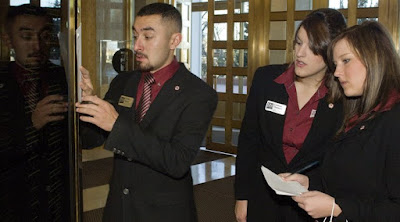 New Mexico State University Department Agriculture and Home Economics students Dennis Garcia, Rachael Lindsay Thomen and DeeAnn Shafer, representing a group of "Ambassadors" wear their uniforms with their name tags as they visited the Roundhouse. They stopped at the kiosk to locate their legislator's office numbers.
New Mexico State University Department Agriculture and Home Economics students Dennis Garcia, Rachael Lindsay Thomen and DeeAnn Shafer, representing a group of "Ambassadors" wear their uniforms with their name tags as they visited the Roundhouse. They stopped at the kiosk to locate their legislator's office numbers.
Rep. Chavez should consider every person with whom she comes into contact, as a constituent, whether they reside in her district or not.
Every person has a right to ask her, as an elected representative, to consider their particular issue, whether they are paid to promote an agenda or not.
Everybody is entitled to be equally heard. If she wants to be fair and truly believes in governmental transparency, she will conduct all her contacts in open, not accept: food, drink, money, gift, or favor from those who seek her assistance.
No doubt, governmental consideration is an exercise in priorities, however, those priorities should not be purchased by the well connected or loudest or largest groups.
I know that would make her a rare breed of politician, but it would also make her a true public servant.
How legislators handle donations and whether they are unduly influenced by contributions in granting legislative favor is the greatest problem to decipher.
It is illegal to either buy or sell a vote. There is nothing illegal about supporting a candidate who will vote from the same mindset as their constituents.
How candidates get financed, be it through their own campaigns, or with the support of their Party, or through independent third parties, is the problem to be solved.
A big question is, what role are some of the tax-exempt organizations playing in pushing their political agendas under the protection of the IRS status.
It would seem that anyone who can count, understands the difference between the amount of money not made available by paying taxes and the amount tax-exemption provides. That could be a substantial amount.
Further, if donations to a tax-exempt organization are both unlimited and anonymous, then if one can find a way to push their political agenda, it would be a sweet deal.
That seems to be the accusation against a small number of groups that are associated with the "Progressives." As they call for ethics reform they work feverishly to find ways to avoid playing on the same level field they call for.
There is no question that truly independent individuals or groups who have no association with any campaign may spend as much as they like on any issue. However, there are two points here: tax-exempts may not be political and when their overarching political goal is more important than the individual candidate's election, then the support becomes subservient.
Some activities are clearly legal, while some coordinated efforts, as seen by the crossover of leaders and staff members sitting on multiple boards and or working at multiple levels and moving between the tax-exempt protected arena and the more campaign finance regulated political world raises issues of fraudulent conduct.
There are thousands of tax-exempt organizations that go about doing their good works without ever coming close to being political. The noticeable rise in activity is by a small number of tax-exempt groups who have taken an aggressive posture and are testing the limits as never before.
The only penalty, if that's the right word, for the tax-exempts, is not a limit on their free speech; nothing can take that away from them. The only requirement is that their contributors will have to pay their taxes, just like the rest of us. Organizations will have to declare contributions as political donations on campaign finance documents so the public may inspect where the money came from.
Nothing suggested here prohibits, limits or impedes the philanthropically funded works of the tax-exempt organizations. They are free to espouse the social agenda, just not cross into political campaigns. There are legal ways of doing that, but you don't get the same "bang for your buck."
 The lobbying efforts happen at a number of levels.
The lobbying efforts happen at a number of levels.
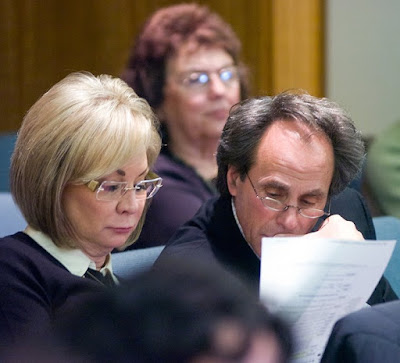
 People clog the halls of the legislature during the committee meetings. Some are registered lobbyists, most are interested in some issue on the agenda. Few just go to the legislature to watch. Most lobbying happens much earlier, before the session, as legislation is drafted. The money that many object to is what is donated to campaigns. The amounts that professional lobbyists earn is more likely a reflection of their persuasive skills, than them carrying money.
People clog the halls of the legislature during the committee meetings. Some are registered lobbyists, most are interested in some issue on the agenda. Few just go to the legislature to watch. Most lobbying happens much earlier, before the session, as legislation is drafted. The money that many object to is what is donated to campaigns. The amounts that professional lobbyists earn is more likely a reflection of their persuasive skills, than them carrying money.Lobbying does not require a person to be paid to push an agenda politically. Anyone who talks to or joins a group to inform their representatives of their particular issues is a lobbyist exercising their First Amendment rights. Many people are unable to recite the later sections of the amendment: the right to peaceably assemble and the right to petition government for a redress of grievance.
More importantly, Chavez doesn’t recognize her obligation as a governmental representative to honor the First Amendment’s prohibition, “Congress shall make no law…” when she tries to precondition citizens who petition her and her colleagues with their issues making them wear identifiers.
 New Mexico State University Department Agriculture and Home Economics students Dennis Garcia, Rachael Lindsay Thomen and DeeAnn Shafer, representing a group of "Ambassadors" wear their uniforms with their name tags as they visited the Roundhouse. They stopped at the kiosk to locate their legislator's office numbers.
New Mexico State University Department Agriculture and Home Economics students Dennis Garcia, Rachael Lindsay Thomen and DeeAnn Shafer, representing a group of "Ambassadors" wear their uniforms with their name tags as they visited the Roundhouse. They stopped at the kiosk to locate their legislator's office numbers.Rep. Chavez should consider every person with whom she comes into contact, as a constituent, whether they reside in her district or not.
Every person has a right to ask her, as an elected representative, to consider their particular issue, whether they are paid to promote an agenda or not.
Everybody is entitled to be equally heard. If she wants to be fair and truly believes in governmental transparency, she will conduct all her contacts in open, not accept: food, drink, money, gift, or favor from those who seek her assistance.
No doubt, governmental consideration is an exercise in priorities, however, those priorities should not be purchased by the well connected or loudest or largest groups.
I know that would make her a rare breed of politician, but it would also make her a true public servant.
How legislators handle donations and whether they are unduly influenced by contributions in granting legislative favor is the greatest problem to decipher.
It is illegal to either buy or sell a vote. There is nothing illegal about supporting a candidate who will vote from the same mindset as their constituents.
How candidates get financed, be it through their own campaigns, or with the support of their Party, or through independent third parties, is the problem to be solved.
A big question is, what role are some of the tax-exempt organizations playing in pushing their political agendas under the protection of the IRS status.
It would seem that anyone who can count, understands the difference between the amount of money not made available by paying taxes and the amount tax-exemption provides. That could be a substantial amount.
Further, if donations to a tax-exempt organization are both unlimited and anonymous, then if one can find a way to push their political agenda, it would be a sweet deal.
That seems to be the accusation against a small number of groups that are associated with the "Progressives." As they call for ethics reform they work feverishly to find ways to avoid playing on the same level field they call for.
There is no question that truly independent individuals or groups who have no association with any campaign may spend as much as they like on any issue. However, there are two points here: tax-exempts may not be political and when their overarching political goal is more important than the individual candidate's election, then the support becomes subservient.
Some activities are clearly legal, while some coordinated efforts, as seen by the crossover of leaders and staff members sitting on multiple boards and or working at multiple levels and moving between the tax-exempt protected arena and the more campaign finance regulated political world raises issues of fraudulent conduct.
There are thousands of tax-exempt organizations that go about doing their good works without ever coming close to being political. The noticeable rise in activity is by a small number of tax-exempt groups who have taken an aggressive posture and are testing the limits as never before.
The only penalty, if that's the right word, for the tax-exempts, is not a limit on their free speech; nothing can take that away from them. The only requirement is that their contributors will have to pay their taxes, just like the rest of us. Organizations will have to declare contributions as political donations on campaign finance documents so the public may inspect where the money came from.
Nothing suggested here prohibits, limits or impedes the philanthropically funded works of the tax-exempt organizations. They are free to espouse the social agenda, just not cross into political campaigns. There are legal ways of doing that, but you don't get the same "bang for your buck."
 The lobbying efforts happen at a number of levels.
The lobbying efforts happen at a number of levels.
This is Attorney General Gary King’s Legislative Team Leader Stuart Bluestone, right, reviewing a piece of legislation with Terri Cole, who represents the Greater Albuquerque Chamber of Commerce. She is considered by some to hold a great deal of influence because of the large number of businesses for whom Cole speaks. Bluestone, addressed the Senate Rules Committee on many issues including the proposed ethics commission legislation. He serves in a dual capacity: lobbying, by stating the AG's office supports particular bills, and by advising on legal matters before the committee.
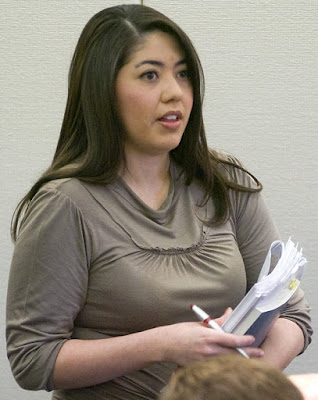 Secretary of State Ethics Officer Tessa Jo Mascarenas, spoke to the Senate Rules Committee about the burden that new ethics reform legislation places on her office, especially when the necessary funding is not included in the bill. Much of the state's ethics requirements are handled through the SoS's office by reports filed by: candidates, campaigns, third party groups, and lobbyists .
Secretary of State Ethics Officer Tessa Jo Mascarenas, spoke to the Senate Rules Committee about the burden that new ethics reform legislation places on her office, especially when the necessary funding is not included in the bill. Much of the state's ethics requirements are handled through the SoS's office by reports filed by: candidates, campaigns, third party groups, and lobbyists .
 Other government workers also lobby for their respective departments or to add information to committee debates. They include: Stephanie Kiger, who as of April 6, is now Deputy Counsel to the Governor. She was an associate counsel at the time of this picture, before her new appointment, New Mexico Institute of Mining and Technology President Dr. Daniel López, center, Attorney David Barton, of the Public Regulations Commissions' general counsel's office, and Bureau of Elections Administrator Kelli Fulgenzi, right, who spoke about the effects of campaign reporting requirements on the Secretary of State’s office.
Other government workers also lobby for their respective departments or to add information to committee debates. They include: Stephanie Kiger, who as of April 6, is now Deputy Counsel to the Governor. She was an associate counsel at the time of this picture, before her new appointment, New Mexico Institute of Mining and Technology President Dr. Daniel López, center, Attorney David Barton, of the Public Regulations Commissions' general counsel's office, and Bureau of Elections Administrator Kelli Fulgenzi, right, who spoke about the effects of campaign reporting requirements on the Secretary of State’s office.
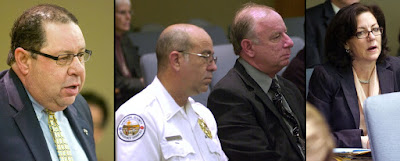 Municipal, local governmental officials and extra governmental entities act as lobbyists pushing for approval of capital expenditures, and other issues, including: Clovis Mayor Pro Tem Michael Miller, left, Sandoval County Emergency Services Coordinator Mike Scales, left of center photo, and New Mexico's Council of University Presidents Communications Specialist Theresa Graham, right.
Municipal, local governmental officials and extra governmental entities act as lobbyists pushing for approval of capital expenditures, and other issues, including: Clovis Mayor Pro Tem Michael Miller, left, Sandoval County Emergency Services Coordinator Mike Scales, left of center photo, and New Mexico's Council of University Presidents Communications Specialist Theresa Graham, right.
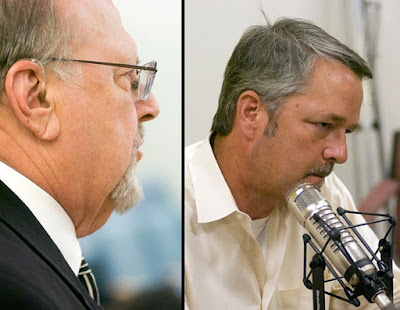 There are the powerhouse lobbyists like: Cole, above, William Fulginiti, left, who represents the New Mexico Municipal League, an association of cities, towns and villages. During the session, I didn't even see one of the real power players. Scott Scanland, right, who lobbies for a number of diverse interests. Here he is shown on Joe Monahan's election coverage radio shows on KANW FM 89.1, as the chief statistician and the "neutral" tea leaf reader.
There are the powerhouse lobbyists like: Cole, above, William Fulginiti, left, who represents the New Mexico Municipal League, an association of cities, towns and villages. During the session, I didn't even see one of the real power players. Scott Scanland, right, who lobbies for a number of diverse interests. Here he is shown on Joe Monahan's election coverage radio shows on KANW FM 89.1, as the chief statistician and the "neutral" tea leaf reader.
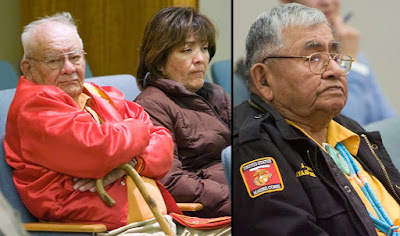 These are supporters, of Senate Joint Memorial 32, Navajo Code Talker Museum and Veterans' Center, sponsored by Sen. John Pinto, D, McKinley and San Juan Counties, that went on to be passed unanimously in both houses and signed by the Governor. Marine Codetalker Keith Little, left, with fellow supporters.
These are supporters, of Senate Joint Memorial 32, Navajo Code Talker Museum and Veterans' Center, sponsored by Sen. John Pinto, D, McKinley and San Juan Counties, that went on to be passed unanimously in both houses and signed by the Governor. Marine Codetalker Keith Little, left, with fellow supporters.
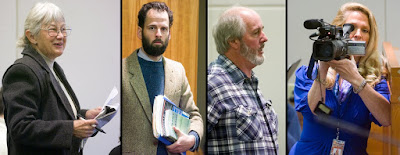 People associated with political parties monitor the progress of legislation, sometimes speaking for or against a bill or documenting. Here during the Senate Rules committee are: former Democratic candidate for State Representative District 59, Dr. Ellen Wedum, former Democratic U.S. Senate primary candidate Leland Lehrman, a registered lobbyist for Mother Media, Democracy for New Mexico's Terry Riley, and Senate GOP Majority Communications Director Diane Kinderwater.
People associated with political parties monitor the progress of legislation, sometimes speaking for or against a bill or documenting. Here during the Senate Rules committee are: former Democratic candidate for State Representative District 59, Dr. Ellen Wedum, former Democratic U.S. Senate primary candidate Leland Lehrman, a registered lobbyist for Mother Media, Democracy for New Mexico's Terry Riley, and Senate GOP Majority Communications Director Diane Kinderwater.
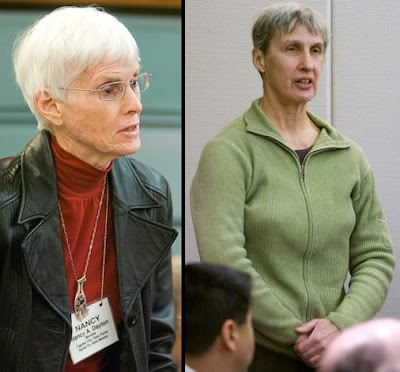 Then there are lobbyists who represent wide-ranging nonprofit, nonpartisan membership organizations, like: AARP’s Nancy Ann Dayton, and President of the League of Women Voters of NM Kathy Campbell.
Then there are lobbyists who represent wide-ranging nonprofit, nonpartisan membership organizations, like: AARP’s Nancy Ann Dayton, and President of the League of Women Voters of NM Kathy Campbell.
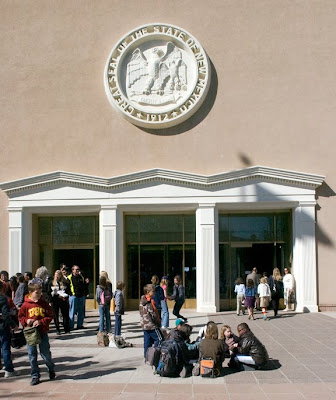 Groups of people, including students, gather at the Capitol, many for what are known as "a day at the Capitol," to express their support for legislation they wish passed or to be in opposition.
Groups of people, including students, gather at the Capitol, many for what are known as "a day at the Capitol," to express their support for legislation they wish passed or to be in opposition.
 Almost daily, some group, like this one honoring the birth of Martin Luther King Jr., will hold a rally in the rotunda where speeches, entertainment and demonstrations occur.
Almost daily, some group, like this one honoring the birth of Martin Luther King Jr., will hold a rally in the rotunda where speeches, entertainment and demonstrations occur.
 Here, children from Albuquerque’s fourth-graders from Carlos Rey Elementary School joined a group called Wild Friends, before, Senate Rules Committee on House Joint Memorial 4, Wildlife Corridor Info Sharing, sponsored by Rep. Mimi Stewart, D, Bernalillo County.
Here, children from Albuquerque’s fourth-graders from Carlos Rey Elementary School joined a group called Wild Friends, before, Senate Rules Committee on House Joint Memorial 4, Wildlife Corridor Info Sharing, sponsored by Rep. Mimi Stewart, D, Bernalillo County.
 Wild Friends, is a part of the Center for Wildlife Law, at the University of New Mexico’s School of Law Institute of Public Law and enlists students to move their agenda forward. Who could turn down kids or fury animals?
Wild Friends, is a part of the Center for Wildlife Law, at the University of New Mexico’s School of Law Institute of Public Law and enlists students to move their agenda forward. Who could turn down kids or fury animals?
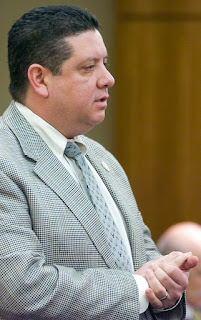 Game and Fish Law Enforcement Chief Patrick H. Block, spoke in support of the memorial, which passed the house 62-0 and the Senate 37-0; and has been signed by the governor.
Game and Fish Law Enforcement Chief Patrick H. Block, spoke in support of the memorial, which passed the house 62-0 and the Senate 37-0; and has been signed by the governor.
 Many so-called ethics reform bills are perceived to be written backwards; they are written to prohibit individuals from spending their own money as a form of speech.
Many so-called ethics reform bills are perceived to be written backwards; they are written to prohibit individuals from spending their own money as a form of speech.
The more correct way is to write the legislation prohibiting candidates or office holders from accepting money at a specified amount limit. Some will try to argue that it a difference without a distinction, but it's not.
The Supreme Court case of Buckley v. Valeo equated money with free speech. The difference is an individual or group may spend all the money they want, as long as they do not coordinate it with the candidate, campaign or Party.
When one looks at what the "Progressives" have done, I personally have found myself siding with several of their causes. One particular effort was forestalling the forcing of Paseo del Norte extension over the escarpment through the Petroglyph National Monument.
I produced the above montage, of controversial local issues, for a University Art class. Click on the picture to view details.
Eli Il Yong Lee, was the President and CEO of Soltari Inc., he is now the Executive Director of the Center for Civic Policy Center for Civic Action. He is the de-facto head of the local Progressives and currently sits on the City of Albuquerque's charter review task force.
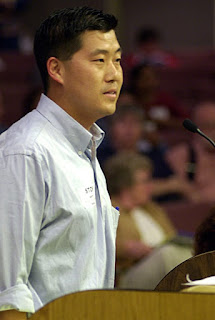 The only encounter I have ever had with Lee, left, was during the ethics board hearings for Mayor Martin Chávez. Lee was present for the several days of the proceedings. He was always in the same location near the back of the room with his laptop computer open and taking notes.
The only encounter I have ever had with Lee, left, was during the ethics board hearings for Mayor Martin Chávez. Lee was present for the several days of the proceedings. He was always in the same location near the back of the room with his laptop computer open and taking notes.
During one of the recesses, I approached, introduced myself and inquired who he was and what his particular interest in the case was. Lee denied he had any interest beyond that of an ordinary citizen.
I didn’t forget who he was, but it took several years before he went public, approaching City Council on some issue and that is when I learned his name and associations.
Lee can be read at Clearly New Mexico.
In 2003, Lee led the Anti-Road Tax that had the Paseo del Norte extension tucked into it. The tax was defeated. A couple of years later, with the extension in the open the bonding was approved.
Albuquerque "Progressives" began appearing on the scene in 2001 with the help of Lee’s Soltari Inc. Executive Director New Mexico Voices for Children Eric Griego, was elected to the Albuquerque City Council in 2002. Griego’s profession shaped his political history. He ran for Mayor in 2005 and was defeated by Martin Chávez.
In 2003, Martin Heinrich and Debbie O'Malley were elected to the City Council. Other Soltari clients have included: Gov. Bill Richardson, Lt. Gov. Diane Denish, City Councilors Michael Cadigan and State Sen. Linda Lopez.
In 2005, Soltari candidates and issues did not fare so well. Griego was defeated in a run against Mayor Martin Chávez and voters rejected the minimum wage initiative.
“Albuquerque Clean Elections Campaign Final Summary Report,” by Executive Director, Common Cause New Mexico Matt Brix, was released October 4, 2005. The document outlines the efforts and participants in passing the Open and Ethical Elections code, sponsored by then City Councillor Eric Griego.
 Smoking Gun?
Smoking Gun?
State Republican Chairman Harvey Yates Jr. pointed out to the Conspiracy Brews meeting an article, “Rocky Ride The Republicans’ fall from power in Colorado — and how the Democrats hope to replicate it” which was published in the National Review from a soon to be published book: The Blueprint: How Democrats Won the West (and Why Republicans Should Care), by Rob Witwer and Adam Schrager.
Yates read from the article:
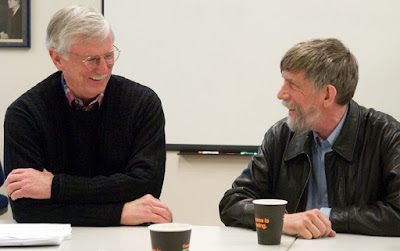 Yates, seen here with the newly elected Bernalillo County Republican Chairman Charlie Tipton, suggested the same thing was happening in New Mexico.
Yates, seen here with the newly elected Bernalillo County Republican Chairman Charlie Tipton, suggested the same thing was happening in New Mexico.
Yates didn’t need to rely solely on a conservative publication, he had also uncovered an internal document from the Progressives outlining plans to create political actions leading to circumventing campaign finance limits and prohibitions against political action by the tax-exempt organizations.
The document, published by the Proteus fund: Report on Six Emerging Collaborative State Projects -- Building long-term capacity in Maine, Michigan, Minnesota, New Mexico, North Carolina and Wisconsin, was prepared for the September 17 – 18, 2007 meeting of the State Strategies Fund held in New York City.
In the report some conflicting information is revealed about the status of Lee’s employment.
On September 30, 2007, Lee, as the President and CEO of Soltari Inc., made a $250 donation for the primary campaign of Democrat Martin Heinrich For Congress. It was one of three donations made, totaling $950 to Heinrich. Lee made other donations later as Executive Director of the Center for Civic Policy.
The importance of the dates are that they conflict with what the federally required report reads about Lee being either the President and CEO of Soltari Inc., or Executive Director of the Center for Civic Policy. Sometime in late 2007, or early 2008, Soltari ceased being a commercial political consulting group and moved its entire operation to the tax-exempt Center for Civic Policy and its sister organization, the Center for Civic Action. The report also notes:
The Internal Revenue’s tax-exempt certified organizations have some important benefits in the public realm. Tax-exempt organizations have no limit on the size of donations they may receive and the name of the donor does not have to be reported. Political activity is specifically outlawed by IRS rules.
The organizations admit to having sent fliers to targeted legislative areas in an effort to, as they assert, pass on educational information. The fliers looked like the kinds of political documents in vogue in New Mexico at this time; they use the rhetoric of attack ads, imagery that imparts disgust fro incumbents who are in disfavor with the ideology of the organization, and end with a call for action. An example was a flier put out to “inform’ voters that their incumbent had taken “large” donations from, what are described as “special interest groups” and voted for legislation favorable to the special interest and to the detriment of the community. The flier had a call to action. It listed the incumbents' phone number and implored the voter to call and tell their legislator not to take the special interest’s money and to remember that they work for the citizens.
The Attorney General advised the Secretary of State to order the groups to file campaign finance documents.
The tax-exempt organizations denied having done anything wrong and filed a preemptive lawsuit against Attorney General and Secretary of State.
The groups demand that the Attorney General explaine the law to them. That's not how it works in the United States. Legislatures pass laws, they are codified and available. The people are required to obey them, if people have questions, they go to an attorney for legal advice. If the state is not satisfied with the compliance then they may take administrative or criminal action.
In questioning the tax-exempts, their defenders engage in double speak saying that they have never mentioned the name of any political candidate, or spoken at times that the federal government has deemed to be campaign season.
However, neither of those things is true. Fliers were produced with incumbent candidates names on them allegedly as voter education pieces. If objectively analyzed by students of political rhetoric, campaign advertising, and persuasion, one can only conclude that the use of the medium mirrors that of traditional negative campaign attack medium and it would be virtually impossible to recognize or distinguish them as anything other than political hit pieces.
You decide.
The State Strategies Fund report contains language provided by Lee’s group that clearly sets out their intentions to influence the outcome of elections:
During the recently ended legislative session, any mention of attempts to have the tax-exempt 501 (c) (3) and 501 (c) (4) organizations held accountable was met with a lobbyist's wall of fire.
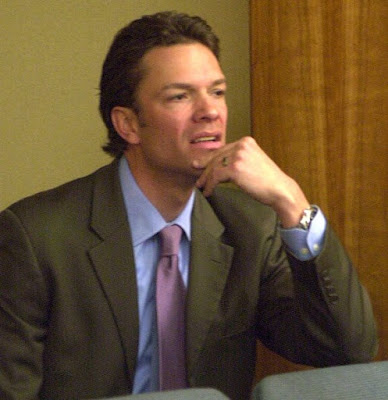 Former head of Common Cause and a member of the Governor's Ethics Task Force who is currently Policy Director for the Center for Civic Policy Matt Brix, above, lobbies for it and also the Center for Civic Action.
Former head of Common Cause and a member of the Governor's Ethics Task Force who is currently Policy Director for the Center for Civic Policy Matt Brix, above, lobbies for it and also the Center for Civic Action.
During the discussion of SB 247, Third-Party Registration Agents, introduced by Sen. Ryan, lobbyists for the tax exempt groups simultaneously rose up to denounce any attempt to hold them to any requirements that apply to other organizations that gather voter registration signatures.
The incident reveals the arrogance of these groups, who believe the protected tax-exempt IRS status, grants them some additional level of protection from state statutes.
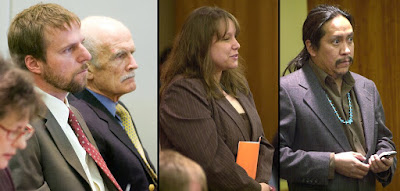 Current Executive Director of Common Cause Allen with Common Cause Board Member Jim Harrington, Leanne Leith, a lobbyist for Conservation Voters of NM, and SAGE Council’s Executive Director Sonny Weahkee represent three of the five groups associated with Lee's Center for Civic Policy. the other two are, the League of Young Voters and the Southwest Organizing Project engaged in lobbying.
Current Executive Director of Common Cause Allen with Common Cause Board Member Jim Harrington, Leanne Leith, a lobbyist for Conservation Voters of NM, and SAGE Council’s Executive Director Sonny Weahkee represent three of the five groups associated with Lee's Center for Civic Policy. the other two are, the League of Young Voters and the Southwest Organizing Project engaged in lobbying.
I did not capture representatives of LYV or SWOP engaged in lobbying. Tough SWOP Grants Administrator Marjorie Childress was present, one day, she was representing the New Mexico Independent, and not SWOP.
CVNM is a non-profit 501 (c) (4) organization. CVNM is a member of the Center for Civic Policy group, but their educational activities differ significantly. They use a scorecard of all 112 State Legislators to rank performance consistent with their agenda.
Allen made it clear that Common Cause dose not engage in voter Registration activities and would not have been affected by the Ryan bill.
 Coffee Break...
Coffee Break...
OK, I thought the coffee fund wasn't paid by taxpayers.
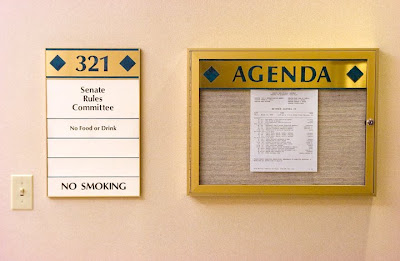 Not withstanding the admonition against food or drink, coffee seems the beverage of choice early in the morning for legislators in committee.
Not withstanding the admonition against food or drink, coffee seems the beverage of choice early in the morning for legislators in committee.
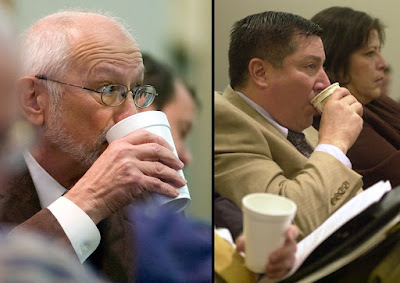 Sens. Gerald Ortiz y Pino, D, Bernalillo County, left and George K. Munoz , D, Cibola and McKinley Counties partake.
Sens. Gerald Ortiz y Pino, D, Bernalillo County, left and George K. Munoz , D, Cibola and McKinley Counties partake.
In an earlier post I made reference to a coffee fund. I had sought a clarification on how the coffee fund worked, but did not get an answer before posting. I asked in an e-mail to one of the committee's analysts, Matt Baca:
"I have a question about the refreshments that are provided in the Senate Rules committee room specifically. Who funds that food and drink?"
I have since gotten a response:
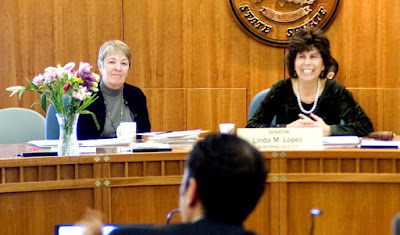 “Interesting. The food doesn't come into play much,” Baca wrote. "Laine [Renfero-Sedillo, above left,] (the committee secretary) cooks the fritatas every morning, I'm not sure where the juices came from; probably from the coffee shop downstairs. "
“Interesting. The food doesn't come into play much,” Baca wrote. "Laine [Renfero-Sedillo, above left,] (the committee secretary) cooks the fritatas every morning, I'm not sure where the juices came from; probably from the coffee shop downstairs. "
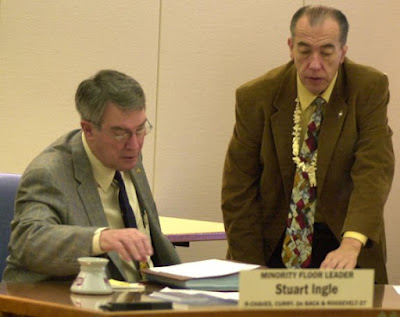 "When we ran out of water and coffee a few weeks ago I bought some," Baca wrote, "David Ortiz also cooked a few times. " Ortiz, above, is the Assistant Sergeant at Arms for the Senate and staffs the Rules committee. Here he provides an updated draft of a bill to Sen. Ingle.
"When we ran out of water and coffee a few weeks ago I bought some," Baca wrote, "David Ortiz also cooked a few times. " Ortiz, above, is the Assistant Sergeant at Arms for the Senate and staffs the Rules committee. Here he provides an updated draft of a bill to Sen. Ingle.
“Sometimes a lobbyist will offer to pay (Dick Minzner bought breakfast burritos for the committee the second to last Friday - also from the coffee shop) or will reimburse Laine,” wrote Baca.
Inquiring about the practice on the House side, each committee seems to handle the issue of food and drink in their own way. Some have coffee funds, to which the legislators contribute, while some committee chairs provide for their members. It seems that lobbyists on occasion also will provide refreshments.
My point of the cost of technicians may have been off target. However, even if there is no government money involved in any coffee funds my point was that the cost of video technicians to run cameras of the senate floor doesn't amount to a pile of discarded coffee ground in the grand scheme of things.
 The New Mexico Independent's Trip Jennings is reporting, "Guv: More ethics reform for special session possible."
The New Mexico Independent's Trip Jennings is reporting, "Guv: More ethics reform for special session possible."
There is a continuing groundswell for ethics reform legislation according to Heath Haussamen on New Mexico Politics posting, "Momentum for reform was 'too great' to resist."
A special session seems inevitable, because of the federal stimulus money coming to the State. It is likely that the session would be called after the Legislative Council's July's consensus report. Some believe it would happen a couple months later so that early spending figures may be included in the analysis. However, a special session could be completed in a matter of days and ethics reform legislation does not hold the same allure as does divvying up money.
 One Final Weird Note.
One Final Weird Note.
During the Domestic Partnership debate on SB 12 sponsored by Sen. McSorley, the archdiocese weighed in questioning the morality of the bill.
Several groups, bloggers and those commenting on such sites raised the church’s involvement in the debate, claiming at least three things: that the theory of separation of church and state, should have kept the church out of the debate, the church’s entry into the debate should threaten the Catholic’s Internal Revenue 501 (c) (3) tax-exempt status, and the church was wrong in their stand.
A quick dissection would show that the Catholic Church stated its moral opposition on an issue. They do that all the time on issues that don’t raise the ire in less controversial issues. Others do to.
Many people miss the meaning of the theory of separation of church and state. The First Amendment states, in part:
The IRS’ 501 (c) (3) tax-exempt status is used to keep church’s from endorsing or campaigning for or against candidates, not from stating their beliefs.
Nothing could be more hypocritical than to suggest that one tax-exempt organization should have its status lifted for something considered legal under the rules by supporters of groups who appear to be violating those same rules.
As to the question of whether the church was wrong in their stand, I’ll leave to the interested parties. I don’t have a dog in this fight: I’m neither married or a Catholic. I believe in equal rights for People and don’t think that governments should establish laws that support one kind of protection at the expense of others based on those distinctions that differ us. Those distinctions are what Jefferson termed as unalienable rights, including the freedom to not be discriminated based on: race, religion, creed, color, age, sex, national origin, or gender identity.
The issue was defeated in this session of the legislature.
In assisting, then Sandoval County Clerk, Victoria Dunlap with a due process issue related to her issuing marriage licenses, it appears that based on the States Constitution’s Sec. 18, Due process; equal protection; sex discrimination clause and The New Mexico Human Rights Act amendment prohibits discrimination based on the definitions of several descriptions including: sexual orientation and gender identity, it is legal to issue licenses to "couples." However, no one is willing to challenge the right to exercise the law. The licenses issued by Dunlap were never challenged in court and are legal today.
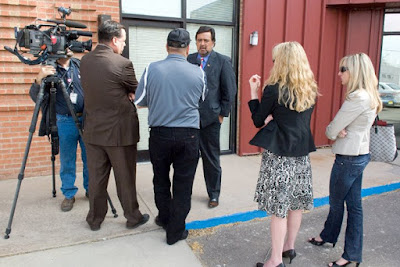 Gov. Richardson, above, after a bill signing in Albuquerque, told Peter St. Cyr, in the gray shirt, that he is willing to put Domestic Partnership on the call for a special session, but only if both sides can agree on some common language.
Gov. Richardson, above, after a bill signing in Albuquerque, told Peter St. Cyr, in the gray shirt, that he is willing to put Domestic Partnership on the call for a special session, but only if both sides can agree on some common language.
 Disclosure
Disclosure
I have been working with Harold Morgan, a 40-year professional journalistic acquaintance. Most recently we have been working on Capitol Report New Mexico. It started as a magazine a couple of years ago and then went into hibernation and has been revived as a newsprint product when the Rio Grande Foundation purchased it. The Rio Grande Foundation is a 501 (c) (3) tax-exempt, non-profit research institute.
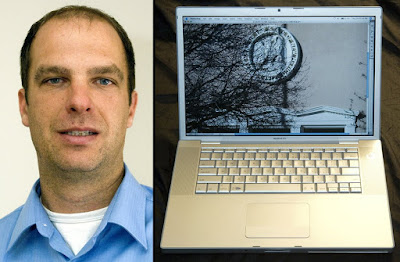 I have no direct dealing with the foundation, nor do they pay me. Other than having taken pictures of the President, Paul Gessing for his column and one for their self-promotion ad. Morgan, the writers, columnists, and I are free from any outside editorial influence. Other than newsprint, rather than slick magazine paper stock, and black and white printing, rather than color, the content is virtually the same.
I have no direct dealing with the foundation, nor do they pay me. Other than having taken pictures of the President, Paul Gessing for his column and one for their self-promotion ad. Morgan, the writers, columnists, and I are free from any outside editorial influence. Other than newsprint, rather than slick magazine paper stock, and black and white printing, rather than color, the content is virtually the same.
 Secretary of State Ethics Officer Tessa Jo Mascarenas, spoke to the Senate Rules Committee about the burden that new ethics reform legislation places on her office, especially when the necessary funding is not included in the bill. Much of the state's ethics requirements are handled through the SoS's office by reports filed by: candidates, campaigns, third party groups, and lobbyists .
Secretary of State Ethics Officer Tessa Jo Mascarenas, spoke to the Senate Rules Committee about the burden that new ethics reform legislation places on her office, especially when the necessary funding is not included in the bill. Much of the state's ethics requirements are handled through the SoS's office by reports filed by: candidates, campaigns, third party groups, and lobbyists . Other government workers also lobby for their respective departments or to add information to committee debates. They include: Stephanie Kiger, who as of April 6, is now Deputy Counsel to the Governor. She was an associate counsel at the time of this picture, before her new appointment, New Mexico Institute of Mining and Technology President Dr. Daniel López, center, Attorney David Barton, of the Public Regulations Commissions' general counsel's office, and Bureau of Elections Administrator Kelli Fulgenzi, right, who spoke about the effects of campaign reporting requirements on the Secretary of State’s office.
Other government workers also lobby for their respective departments or to add information to committee debates. They include: Stephanie Kiger, who as of April 6, is now Deputy Counsel to the Governor. She was an associate counsel at the time of this picture, before her new appointment, New Mexico Institute of Mining and Technology President Dr. Daniel López, center, Attorney David Barton, of the Public Regulations Commissions' general counsel's office, and Bureau of Elections Administrator Kelli Fulgenzi, right, who spoke about the effects of campaign reporting requirements on the Secretary of State’s office. Municipal, local governmental officials and extra governmental entities act as lobbyists pushing for approval of capital expenditures, and other issues, including: Clovis Mayor Pro Tem Michael Miller, left, Sandoval County Emergency Services Coordinator Mike Scales, left of center photo, and New Mexico's Council of University Presidents Communications Specialist Theresa Graham, right.
Municipal, local governmental officials and extra governmental entities act as lobbyists pushing for approval of capital expenditures, and other issues, including: Clovis Mayor Pro Tem Michael Miller, left, Sandoval County Emergency Services Coordinator Mike Scales, left of center photo, and New Mexico's Council of University Presidents Communications Specialist Theresa Graham, right. There are the powerhouse lobbyists like: Cole, above, William Fulginiti, left, who represents the New Mexico Municipal League, an association of cities, towns and villages. During the session, I didn't even see one of the real power players. Scott Scanland, right, who lobbies for a number of diverse interests. Here he is shown on Joe Monahan's election coverage radio shows on KANW FM 89.1, as the chief statistician and the "neutral" tea leaf reader.
There are the powerhouse lobbyists like: Cole, above, William Fulginiti, left, who represents the New Mexico Municipal League, an association of cities, towns and villages. During the session, I didn't even see one of the real power players. Scott Scanland, right, who lobbies for a number of diverse interests. Here he is shown on Joe Monahan's election coverage radio shows on KANW FM 89.1, as the chief statistician and the "neutral" tea leaf reader. These are supporters, of Senate Joint Memorial 32, Navajo Code Talker Museum and Veterans' Center, sponsored by Sen. John Pinto, D, McKinley and San Juan Counties, that went on to be passed unanimously in both houses and signed by the Governor. Marine Codetalker Keith Little, left, with fellow supporters.
These are supporters, of Senate Joint Memorial 32, Navajo Code Talker Museum and Veterans' Center, sponsored by Sen. John Pinto, D, McKinley and San Juan Counties, that went on to be passed unanimously in both houses and signed by the Governor. Marine Codetalker Keith Little, left, with fellow supporters. People associated with political parties monitor the progress of legislation, sometimes speaking for or against a bill or documenting. Here during the Senate Rules committee are: former Democratic candidate for State Representative District 59, Dr. Ellen Wedum, former Democratic U.S. Senate primary candidate Leland Lehrman, a registered lobbyist for Mother Media, Democracy for New Mexico's Terry Riley, and Senate GOP Majority Communications Director Diane Kinderwater.
People associated with political parties monitor the progress of legislation, sometimes speaking for or against a bill or documenting. Here during the Senate Rules committee are: former Democratic candidate for State Representative District 59, Dr. Ellen Wedum, former Democratic U.S. Senate primary candidate Leland Lehrman, a registered lobbyist for Mother Media, Democracy for New Mexico's Terry Riley, and Senate GOP Majority Communications Director Diane Kinderwater. Then there are lobbyists who represent wide-ranging nonprofit, nonpartisan membership organizations, like: AARP’s Nancy Ann Dayton, and President of the League of Women Voters of NM Kathy Campbell.
Then there are lobbyists who represent wide-ranging nonprofit, nonpartisan membership organizations, like: AARP’s Nancy Ann Dayton, and President of the League of Women Voters of NM Kathy Campbell. Groups of people, including students, gather at the Capitol, many for what are known as "a day at the Capitol," to express their support for legislation they wish passed or to be in opposition.
Groups of people, including students, gather at the Capitol, many for what are known as "a day at the Capitol," to express their support for legislation they wish passed or to be in opposition. Almost daily, some group, like this one honoring the birth of Martin Luther King Jr., will hold a rally in the rotunda where speeches, entertainment and demonstrations occur.
Almost daily, some group, like this one honoring the birth of Martin Luther King Jr., will hold a rally in the rotunda where speeches, entertainment and demonstrations occur. Here, children from Albuquerque’s fourth-graders from Carlos Rey Elementary School joined a group called Wild Friends, before, Senate Rules Committee on House Joint Memorial 4, Wildlife Corridor Info Sharing, sponsored by Rep. Mimi Stewart, D, Bernalillo County.
Here, children from Albuquerque’s fourth-graders from Carlos Rey Elementary School joined a group called Wild Friends, before, Senate Rules Committee on House Joint Memorial 4, Wildlife Corridor Info Sharing, sponsored by Rep. Mimi Stewart, D, Bernalillo County. Wild Friends, is a part of the Center for Wildlife Law, at the University of New Mexico’s School of Law Institute of Public Law and enlists students to move their agenda forward. Who could turn down kids or fury animals?
Wild Friends, is a part of the Center for Wildlife Law, at the University of New Mexico’s School of Law Institute of Public Law and enlists students to move their agenda forward. Who could turn down kids or fury animals? Game and Fish Law Enforcement Chief Patrick H. Block, spoke in support of the memorial, which passed the house 62-0 and the Senate 37-0; and has been signed by the governor.
Game and Fish Law Enforcement Chief Patrick H. Block, spoke in support of the memorial, which passed the house 62-0 and the Senate 37-0; and has been signed by the governor. Many so-called ethics reform bills are perceived to be written backwards; they are written to prohibit individuals from spending their own money as a form of speech.
Many so-called ethics reform bills are perceived to be written backwards; they are written to prohibit individuals from spending their own money as a form of speech.The more correct way is to write the legislation prohibiting candidates or office holders from accepting money at a specified amount limit. Some will try to argue that it a difference without a distinction, but it's not.
The Supreme Court case of Buckley v. Valeo equated money with free speech. The difference is an individual or group may spend all the money they want, as long as they do not coordinate it with the candidate, campaign or Party.
Read a PBS New Hour analysis on the argument that there should be no court authorized difference between contributions and expenditures arguing that it is all political speech and there are other ways of prohibiting corruption than through monetary limits.
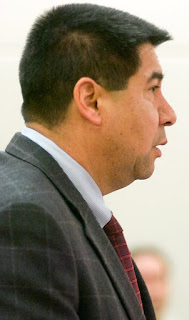 In reality few individuals will spend their political money independently. More often citizens donate directly to a candidate, campaign or party allowing them to decide how best to coordinate the spending of such money.
In reality few individuals will spend their political money independently. More often citizens donate directly to a candidate, campaign or party allowing them to decide how best to coordinate the spending of such money.
New Mexico Assistant Attorney General Phil Baca, left, who drafted many of the ethics bills, said that the bills, and specifically SB 116, contribution limits, which became law, was written both ways. Here is an example from the bill of existing language:
 In reality few individuals will spend their political money independently. More often citizens donate directly to a candidate, campaign or party allowing them to decide how best to coordinate the spending of such money.
In reality few individuals will spend their political money independently. More often citizens donate directly to a candidate, campaign or party allowing them to decide how best to coordinate the spending of such money.New Mexico Assistant Attorney General Phil Baca, left, who drafted many of the ethics bills, said that the bills, and specifically SB 116, contribution limits, which became law, was written both ways. Here is an example from the bill of existing language:
Lobbying is a Constitutionally protected right and it is a bit disheartening to see one group of legislator's backers accuse some lobbyists of spending huge amounts of corporate funds to push favorable passage of legislation. At the same time, organizations that worked diligently to assist the new "Progressive" law makers get elected are likewise accused of hiding unlimited amounts of money behind their federal tax-exempt status, and they claim they had no political role in the defeats.A person shall not knowingly accept or solicit a contribution, directly or indirectly, including a contribution earmarked or otherwise directed or coordinated through a third party, that violates the contribution limits provided for in this section.
The "Progressive" label has a long history. Apparently, it has several meanings and though related there are distinctions. Currently, Republicans wish to associate it with liberalism.
It might be easy to make a list of all the things that the local "Progressive" movement has been involved with over the past few years and say that’s how bad they are, but that would be so inaccurate.
It might be easy to make a list of all the things that the local "Progressive" movement has been involved with over the past few years and say that’s how bad they are, but that would be so inaccurate.
I produced the above montage, of controversial local issues, for a University Art class. Click on the picture to view details.
Eli Il Yong Lee, was the President and CEO of Soltari Inc., he is now the Executive Director of the Center for Civic Policy Center for Civic Action. He is the de-facto head of the local Progressives and currently sits on the City of Albuquerque's charter review task force.
 The only encounter I have ever had with Lee, left, was during the ethics board hearings for Mayor Martin Chávez. Lee was present for the several days of the proceedings. He was always in the same location near the back of the room with his laptop computer open and taking notes.
The only encounter I have ever had with Lee, left, was during the ethics board hearings for Mayor Martin Chávez. Lee was present for the several days of the proceedings. He was always in the same location near the back of the room with his laptop computer open and taking notes.During one of the recesses, I approached, introduced myself and inquired who he was and what his particular interest in the case was. Lee denied he had any interest beyond that of an ordinary citizen.
I didn’t forget who he was, but it took several years before he went public, approaching City Council on some issue and that is when I learned his name and associations.
Lee can be read at Clearly New Mexico.
In 2003, Lee led the Anti-Road Tax that had the Paseo del Norte extension tucked into it. The tax was defeated. A couple of years later, with the extension in the open the bonding was approved.
Albuquerque "Progressives" began appearing on the scene in 2001 with the help of Lee’s Soltari Inc. Executive Director New Mexico Voices for Children Eric Griego, was elected to the Albuquerque City Council in 2002. Griego’s profession shaped his political history. He ran for Mayor in 2005 and was defeated by Martin Chávez.
In 2003, Martin Heinrich and Debbie O'Malley were elected to the City Council. Other Soltari clients have included: Gov. Bill Richardson, Lt. Gov. Diane Denish, City Councilors Michael Cadigan and State Sen. Linda Lopez.
In 2005, Soltari candidates and issues did not fare so well. Griego was defeated in a run against Mayor Martin Chávez and voters rejected the minimum wage initiative.
“Albuquerque Clean Elections Campaign Final Summary Report,” by Executive Director, Common Cause New Mexico Matt Brix, was released October 4, 2005. The document outlines the efforts and participants in passing the Open and Ethical Elections code, sponsored by then City Councillor Eric Griego.
 Smoking Gun?
Smoking Gun?State Republican Chairman Harvey Yates Jr. pointed out to the Conspiracy Brews meeting an article, “Rocky Ride The Republicans’ fall from power in Colorado — and how the Democrats hope to replicate it” which was published in the National Review from a soon to be published book: The Blueprint: How Democrats Won the West (and Why Republicans Should Care), by Rob Witwer and Adam Schrager.
Yates read from the article:
In hindsight, what Colorado Democrats did was as simple as it was effective. First, they built a robust network of nonprofit entities to replace the Colorado Democratic party, which had been rendered obsolete by campaign-finance reform. Second, they raised historic amounts of money from large donors to fund these entities. Third, they developed a consistent, topical message. Fourth, and most important, they put aside their policy differences to focus on the common goal of winning elections. As former Democratic house majority leader Alice Madden later said, “It’s not rocket science.”
 Yates, seen here with the newly elected Bernalillo County Republican Chairman Charlie Tipton, suggested the same thing was happening in New Mexico.
Yates, seen here with the newly elected Bernalillo County Republican Chairman Charlie Tipton, suggested the same thing was happening in New Mexico.Yates didn’t need to rely solely on a conservative publication, he had also uncovered an internal document from the Progressives outlining plans to create political actions leading to circumventing campaign finance limits and prohibitions against political action by the tax-exempt organizations.
The document, published by the Proteus fund: Report on Six Emerging Collaborative State Projects -- Building long-term capacity in Maine, Michigan, Minnesota, New Mexico, North Carolina and Wisconsin, was prepared for the September 17 – 18, 2007 meeting of the State Strategies Fund held in New York City.
In the report some conflicting information is revealed about the status of Lee’s employment.
On September 30, 2007, Lee, as the President and CEO of Soltari Inc., made a $250 donation for the primary campaign of Democrat Martin Heinrich For Congress. It was one of three donations made, totaling $950 to Heinrich. Lee made other donations later as Executive Director of the Center for Civic Policy.
The importance of the dates are that they conflict with what the federally required report reads about Lee being either the President and CEO of Soltari Inc., or Executive Director of the Center for Civic Policy. Sometime in late 2007, or early 2008, Soltari ceased being a commercial political consulting group and moved its entire operation to the tax-exempt Center for Civic Policy and its sister organization, the Center for Civic Action. The report also notes:
…A sponsored project of the New Mexico Community Foundation, CCP is led by former political consultant Eli Lee and the former staff of his consulting firm, Soltari, Inc., who are now full time employees of the Center. The small final number of participating groups, notwithstanding, CCP underwent a year-long selection process that involved a series of meetings.Lee, through the centers, has gathered the cooperation of a number of Internal Revenue certified organizations with 501 (c) (3) and 501 (c) (4) tax-exempt status. There are restrictions on 501 (c) (3) organizations, they specifically may not engage in the political process and the activities of a number of the partners: Common Cause, Conservation Voters New Mexico, League of Young Voters, Sacred Alliance for Grassroots Equality, known as, SAGE Council, and Southwest Organizing Project, have been called into question by the New Mexico Attorney General and Secretary of State.
The Internal Revenue’s tax-exempt certified organizations have some important benefits in the public realm. Tax-exempt organizations have no limit on the size of donations they may receive and the name of the donor does not have to be reported. Political activity is specifically outlawed by IRS rules.
The organizations admit to having sent fliers to targeted legislative areas in an effort to, as they assert, pass on educational information. The fliers looked like the kinds of political documents in vogue in New Mexico at this time; they use the rhetoric of attack ads, imagery that imparts disgust fro incumbents who are in disfavor with the ideology of the organization, and end with a call for action. An example was a flier put out to “inform’ voters that their incumbent had taken “large” donations from, what are described as “special interest groups” and voted for legislation favorable to the special interest and to the detriment of the community. The flier had a call to action. It listed the incumbents' phone number and implored the voter to call and tell their legislator not to take the special interest’s money and to remember that they work for the citizens.
The Attorney General advised the Secretary of State to order the groups to file campaign finance documents.
The tax-exempt organizations denied having done anything wrong and filed a preemptive lawsuit against Attorney General and Secretary of State.
The groups demand that the Attorney General explaine the law to them. That's not how it works in the United States. Legislatures pass laws, they are codified and available. The people are required to obey them, if people have questions, they go to an attorney for legal advice. If the state is not satisfied with the compliance then they may take administrative or criminal action.
In questioning the tax-exempts, their defenders engage in double speak saying that they have never mentioned the name of any political candidate, or spoken at times that the federal government has deemed to be campaign season.
However, neither of those things is true. Fliers were produced with incumbent candidates names on them allegedly as voter education pieces. If objectively analyzed by students of political rhetoric, campaign advertising, and persuasion, one can only conclude that the use of the medium mirrors that of traditional negative campaign attack medium and it would be virtually impossible to recognize or distinguish them as anything other than political hit pieces.
You decide.
The State Strategies Fund report contains language provided by Lee’s group that clearly sets out their intentions to influence the outcome of elections:
B. New Mexico’s evaluation of efforts to shape the electoral battlefieldThe problem is not with what these groups are trying to do; clearly it is political action protected by the First Amendment. What is troubling and looks on its face to be illegal is the means of financing their efforts.
…This is important since they are operating in a civic engagement arena with a goal of shaping the election battlefield and where other partisan efforts are looking for very hard edged outcomes in terms of winning elections.
During the recently ended legislative session, any mention of attempts to have the tax-exempt 501 (c) (3) and 501 (c) (4) organizations held accountable was met with a lobbyist's wall of fire.
 Former head of Common Cause and a member of the Governor's Ethics Task Force who is currently Policy Director for the Center for Civic Policy Matt Brix, above, lobbies for it and also the Center for Civic Action.
Former head of Common Cause and a member of the Governor's Ethics Task Force who is currently Policy Director for the Center for Civic Policy Matt Brix, above, lobbies for it and also the Center for Civic Action.During the discussion of SB 247, Third-Party Registration Agents, introduced by Sen. Ryan, lobbyists for the tax exempt groups simultaneously rose up to denounce any attempt to hold them to any requirements that apply to other organizations that gather voter registration signatures.
The incident reveals the arrogance of these groups, who believe the protected tax-exempt IRS status, grants them some additional level of protection from state statutes.
 Current Executive Director of Common Cause Allen with Common Cause Board Member Jim Harrington, Leanne Leith, a lobbyist for Conservation Voters of NM, and SAGE Council’s Executive Director Sonny Weahkee represent three of the five groups associated with Lee's Center for Civic Policy. the other two are, the League of Young Voters and the Southwest Organizing Project engaged in lobbying.
Current Executive Director of Common Cause Allen with Common Cause Board Member Jim Harrington, Leanne Leith, a lobbyist for Conservation Voters of NM, and SAGE Council’s Executive Director Sonny Weahkee represent three of the five groups associated with Lee's Center for Civic Policy. the other two are, the League of Young Voters and the Southwest Organizing Project engaged in lobbying.I did not capture representatives of LYV or SWOP engaged in lobbying. Tough SWOP Grants Administrator Marjorie Childress was present, one day, she was representing the New Mexico Independent, and not SWOP.
CVNM is a non-profit 501 (c) (4) organization. CVNM is a member of the Center for Civic Policy group, but their educational activities differ significantly. They use a scorecard of all 112 State Legislators to rank performance consistent with their agenda.
Allen made it clear that Common Cause dose not engage in voter Registration activities and would not have been affected by the Ryan bill.
 Coffee Break...
Coffee Break...OK, I thought the coffee fund wasn't paid by taxpayers.
 Not withstanding the admonition against food or drink, coffee seems the beverage of choice early in the morning for legislators in committee.
Not withstanding the admonition against food or drink, coffee seems the beverage of choice early in the morning for legislators in committee. Sens. Gerald Ortiz y Pino, D, Bernalillo County, left and George K. Munoz , D, Cibola and McKinley Counties partake.
Sens. Gerald Ortiz y Pino, D, Bernalillo County, left and George K. Munoz , D, Cibola and McKinley Counties partake.In an earlier post I made reference to a coffee fund. I had sought a clarification on how the coffee fund worked, but did not get an answer before posting. I asked in an e-mail to one of the committee's analysts, Matt Baca:
"I have a question about the refreshments that are provided in the Senate Rules committee room specifically. Who funds that food and drink?"
I have since gotten a response:
 “Interesting. The food doesn't come into play much,” Baca wrote. "Laine [Renfero-Sedillo, above left,] (the committee secretary) cooks the fritatas every morning, I'm not sure where the juices came from; probably from the coffee shop downstairs. "
“Interesting. The food doesn't come into play much,” Baca wrote. "Laine [Renfero-Sedillo, above left,] (the committee secretary) cooks the fritatas every morning, I'm not sure where the juices came from; probably from the coffee shop downstairs. " "When we ran out of water and coffee a few weeks ago I bought some," Baca wrote, "David Ortiz also cooked a few times. " Ortiz, above, is the Assistant Sergeant at Arms for the Senate and staffs the Rules committee. Here he provides an updated draft of a bill to Sen. Ingle.
"When we ran out of water and coffee a few weeks ago I bought some," Baca wrote, "David Ortiz also cooked a few times. " Ortiz, above, is the Assistant Sergeant at Arms for the Senate and staffs the Rules committee. Here he provides an updated draft of a bill to Sen. Ingle.“Sometimes a lobbyist will offer to pay (Dick Minzner bought breakfast burritos for the committee the second to last Friday - also from the coffee shop) or will reimburse Laine,” wrote Baca.
Inquiring about the practice on the House side, each committee seems to handle the issue of food and drink in their own way. Some have coffee funds, to which the legislators contribute, while some committee chairs provide for their members. It seems that lobbyists on occasion also will provide refreshments.
My point of the cost of technicians may have been off target. However, even if there is no government money involved in any coffee funds my point was that the cost of video technicians to run cameras of the senate floor doesn't amount to a pile of discarded coffee ground in the grand scheme of things.
 The New Mexico Independent's Trip Jennings is reporting, "Guv: More ethics reform for special session possible."
The New Mexico Independent's Trip Jennings is reporting, "Guv: More ethics reform for special session possible."There is a continuing groundswell for ethics reform legislation according to Heath Haussamen on New Mexico Politics posting, "Momentum for reform was 'too great' to resist."
A special session seems inevitable, because of the federal stimulus money coming to the State. It is likely that the session would be called after the Legislative Council's July's consensus report. Some believe it would happen a couple months later so that early spending figures may be included in the analysis. However, a special session could be completed in a matter of days and ethics reform legislation does not hold the same allure as does divvying up money.
 One Final Weird Note.
One Final Weird Note.During the Domestic Partnership debate on SB 12 sponsored by Sen. McSorley, the archdiocese weighed in questioning the morality of the bill.
Several groups, bloggers and those commenting on such sites raised the church’s involvement in the debate, claiming at least three things: that the theory of separation of church and state, should have kept the church out of the debate, the church’s entry into the debate should threaten the Catholic’s Internal Revenue 501 (c) (3) tax-exempt status, and the church was wrong in their stand.
A quick dissection would show that the Catholic Church stated its moral opposition on an issue. They do that all the time on issues that don’t raise the ire in less controversial issues. Others do to.
Many people miss the meaning of the theory of separation of church and state. The First Amendment states, in part:
Congress shall make no law respecting an establishment of religion, or prohibiting the free exercise thereof:..It means that state may not adopt or impose a religion on the citizenry and the second part means that the state may not keep any citizen from exercising their particular religion or if they chose, no particular religion.
The IRS’ 501 (c) (3) tax-exempt status is used to keep church’s from endorsing or campaigning for or against candidates, not from stating their beliefs.
Nothing could be more hypocritical than to suggest that one tax-exempt organization should have its status lifted for something considered legal under the rules by supporters of groups who appear to be violating those same rules.
As to the question of whether the church was wrong in their stand, I’ll leave to the interested parties. I don’t have a dog in this fight: I’m neither married or a Catholic. I believe in equal rights for People and don’t think that governments should establish laws that support one kind of protection at the expense of others based on those distinctions that differ us. Those distinctions are what Jefferson termed as unalienable rights, including the freedom to not be discriminated based on: race, religion, creed, color, age, sex, national origin, or gender identity.
The issue was defeated in this session of the legislature.
In assisting, then Sandoval County Clerk, Victoria Dunlap with a due process issue related to her issuing marriage licenses, it appears that based on the States Constitution’s Sec. 18, Due process; equal protection; sex discrimination clause and The New Mexico Human Rights Act amendment prohibits discrimination based on the definitions of several descriptions including: sexual orientation and gender identity, it is legal to issue licenses to "couples." However, no one is willing to challenge the right to exercise the law. The licenses issued by Dunlap were never challenged in court and are legal today.
 Gov. Richardson, above, after a bill signing in Albuquerque, told Peter St. Cyr, in the gray shirt, that he is willing to put Domestic Partnership on the call for a special session, but only if both sides can agree on some common language.
Gov. Richardson, above, after a bill signing in Albuquerque, told Peter St. Cyr, in the gray shirt, that he is willing to put Domestic Partnership on the call for a special session, but only if both sides can agree on some common language. Disclosure
DisclosureI have been working with Harold Morgan, a 40-year professional journalistic acquaintance. Most recently we have been working on Capitol Report New Mexico. It started as a magazine a couple of years ago and then went into hibernation and has been revived as a newsprint product when the Rio Grande Foundation purchased it. The Rio Grande Foundation is a 501 (c) (3) tax-exempt, non-profit research institute.
 I have no direct dealing with the foundation, nor do they pay me. Other than having taken pictures of the President, Paul Gessing for his column and one for their self-promotion ad. Morgan, the writers, columnists, and I are free from any outside editorial influence. Other than newsprint, rather than slick magazine paper stock, and black and white printing, rather than color, the content is virtually the same.
I have no direct dealing with the foundation, nor do they pay me. Other than having taken pictures of the President, Paul Gessing for his column and one for their self-promotion ad. Morgan, the writers, columnists, and I are free from any outside editorial influence. Other than newsprint, rather than slick magazine paper stock, and black and white printing, rather than color, the content is virtually the same.
1 comment:
A fine read Mark.
If legislation is brought to the special session it must be done quickly and with joint efforts of all political factions. If you need assistance in moving this along plesae advise. I think it can be done.
Having seen many lobyists in action, I think they serve a purpose, though many might not like it. As you have pointed out many times transparency is what is needed. The recent push to initiate a more open process in Santa Fe caused quite a stir. This is more likely to cause something much more than a stir.....more like a quantum shift. It would be fun to see.
Regards,
Michael Meyer
Post a Comment